VETERAN BENEFITS
COMPLETE GUIDE TO OREGON AND FEDERAL VETERAN BENEFITS
YOUR VETERAN JOURNEY STARTS HERE


YOUR VETERAN JOURNEY STARTS HERE

This magazine is produced and published by the Oregon Department of Veterans’ Affairs to assist and educate veterans in learning about state and federal veteran benefits.
Information is constantly changing and being updated. Please reach out to your local Veteran Service Office or the relevant contacts below for the most updated information.
OREGON DEPARTMENT OF VETERANS’ AFFAIRS 700 Summer St NE Salem, OR 97301
DIRECTOR’S OFFICE 503 373 2383
STATEWIDE VETERAN SERVICES 503 373 2090
AGING VETERAN SERVICES 503 373 2101
HOME LOAN DEPARTMENT 888 673 8387 homeloans@odva.state.or.us
OREGON VETERANS’ HOME LEBANON 541 497 7265
OREGON VETERANS’ HOME THE DALLES 541 296 7190

CONSERVATORSHIP AND REP PAYEE SERVICES 503 373 2101
COMMUNICATIONS OFFICE 503 373 2390
Whether you’re just getting out of the military or have been a civilian for a while now, this magazine is your informational guide to the benefits and services you’ve earned through your military service.
Stateside or overseas, combat or peacetime, active duty, Reserves, or National Guard: service takes many forms, and Oregon is committed to serving all veterans within its diverse community.
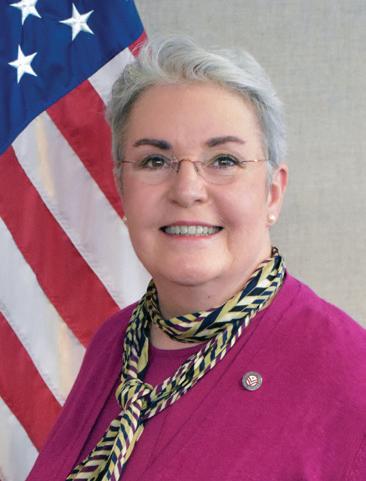
Oregon is proud of the nearly 300,000 veterans representing service in five major wartime eras. From buying a home and earning your degree, filing a disability compensation or pension claim, seeking behavioral health resources, or needing some help with health and aging care options, Oregon veterans can find veteran-specific resources and benefits to help. The robust network of state and federal benefits you will find in this magazine exists to support and serve all veterans and their families.
No matter what your next mission brings, your veteran journey starts here. Welcome home.

Filing a claim is a free service provided by the Oregon Department of Veterans’ Affairs, in partnership with local County Veteran Service Offices (CVSOs), Tribal governments and national veteran service organizations who are accredited by the federal VA and certified by the State of Oregon. Service officers also provide free counseling to help you determine and connect with the veteran benefits and resources for which you are eligible. To schedule an appointment, please contact the office nearest you.
OREGON DEPARTMENT OF VETERANS' AFFAIRS
CLAIMS AND SPECIAL ADVOCACY
General benefit inquiry: ORVets.Benefits@odva.oregon.gov
Aging Veterans: ODVA_Outreach@odva.oregon.gov
Houseless Veterans: houselessvets@odva.oregon.gov
Incarcerated Veterans: incarceratedvets@odva.oregon.gov
LGBTQ+ Veterans: ODVA_LGBTQVets@odva.oregon.gov
Women Veterans: ODVA_ORWomenVets@odva.oregon.gov
ODVA PORTLAND APPEALS OFFICE
503 412 4777
TRIBAL VETERAN SERVICE OFFICES AND REPS
CONFEDERATED TRIBES OF GRAND RONDE
Tribal Veteran Service Office: 503 879 1484
CONFEDERATED TRIBES OF SILETZ
Tribal Veteran Service Representative: 541 444 8330
CONFEDERATED TRIBES OF UMATILLA
Tribal Veteran Service Office: 541 429 7389
CONFEDERATED TRIBES OF WARM SPRINGS
Tribal Veteran Service Office: 541 460 0605
COW CREEK BAND OF UMPQUA
Tribal Veteran Service Representative: 541 677 5513
KLAMATH TRIBES
Tribal Veteran Service Representative: 800 524 9787 x148
NATIONAL VETERAN SERVICE ORGANIZATIONS
AMERICAN LEGION
503 412 4706
DISABLED AMERICAN VETERANS
503 412 4750
NATIONAL ASSOCIATION FOR BLACK VETERANS OF AMERICA
503 412 4159
PARALYZED VETERANS OF AMERICA
504 412 4762
VETERANS OF FOREIGN WARS
503 412 4757
VIETNAM VETERANS OF AMERICA
541 604 0963
COUNTY VETERAN SERVICE OFFICES
BAKER: 541 523 8223
BENTON: 541 368 7100 veterans@ocwcog.org
CLACKAMAS: 503 650 5631 veterans@clackamas.us
CLATSOP: 971 308 1045 clatsopvso@ccaservices.org
COLUMBIA: 541 551 0222
COOS: 541 396 7590 coosvets@co.coos.or.us
CROOK: 541 447 5304 veterans@co.crook.or.us
CURRY: 541 247 3205
DESCHUTES: 541 385 3214 vets@deschutes.org
DOUGLAS: 541 440 4219 veterans@co.douglas.or.us
GILLIAM / SHERMAN / WHEELER 541 705 0051 veteranservices@co.sherman.or.us
GRANT: 541 620 8057
HARNEY: 541 573 1342
HOOD RIVER: 541 386 1080 vsomanager@hoodrivercounty.org
JACKSON: 541 774 8214
JEFFERSON: 541 475 5228 veteransserviceoffice@co.jefferson.or.us
JOSEPHINE: 541 474 5454
KLAMATH: 541 883 4274
LAKE: 541 947 6043
LANE: 541 682 4191 veterans@lanecountyor.gov
LINCOLN: 541 265 0570 vets@co.lincoln.or.us
LINN: 541 967 3882 linnvet@co.linn.or.us
MALHEUR: 541 889 6649 veterans@malheurco.org
MARION: 971 707 4400 info.vso@mwvcaa.org
MORROW: 541 922 6420 mcvets@co.morrow.or.us
MULTNOMAH: 503 988 8387 veteran.services@multco.us
POLK: 503 623 9188
UMATILLA: 541 278 6363
TILLAMOOK: 503 842 4358
UNION: 541 278 6363
WALLOWA: 541 426 0539
WASCO: 541 506 2502
WASHINGTON: 503 846 3060 davsinfo@co.washington.or.us
YAMHILL: 503 434 7503
WORKING WITH A VETERAN SERVICE OFFICE IN OREGON IS A FREE SERVICE provided by the Oregon Department of Veterans’ Affairs and its local, tribal and national partners. County, tribal and national veterans service officers (VSOs) are accredited by the federal VA and certified by the state of Oregon.

The disability compensation and pension claim process begins the moment you file a claim. To file, veterans must sign a power of attorney (POA) that authorizes VSOs to act on your behalf when preparing, presenting and prosecuting your claim for any and all benefits from the federal VA.
Even if you are unsure about the benefits you or your family may qualify for or have been denied in the past, scheduling an appointment with a local VSO will ensure you have access to the full range of earned state and federal veteran benefits and programs to which you are entitled.
ODVA offers special advocacy services for veterans belonging to traditionally underserved groups including women and LGBTQ+ veterans. Use this guide to familiarize yourself with the available veteran benefits, programs, and services offered by the state of Oregon and the federal VA and then use the VSO directory (located on left) to contact ODVA or a VSO in your area.
Federal law grants the US Department of Veterans Affairs (USDVA or simply "the VA") authority to compensate veterans for injuries, disabilities, and conditions that were incurred or aggravated during active military service, provided that you were released under honorable conditions (honorable or general discharge). Filing a claim for disability benefits through the federal VA is actually a legal process. In order to receive benefits and compensation, you must file a claim with the United States proving eligibility through legal, military and medical evidence. Though it is possible to file a claim yourself (just as it is possible to represent yourself in a court of law), it is highly recommended that you seek the free assistance of an accredited veteran service officer (VSO).
STEP 1: MEET WITH A VETERAN SERVICE OFFICER
Your Veteran Service Officer will be able to explain what benefits you may be eligible for, based on your unique military service and circumstances. They will work with you to establish a plan to gather needed evidence and file a disability claim.
If possible, you should bring a copy of your DD214 or other discharge document with you to your first appointment. If you do not have a copy of your discharge records, your VSO will be able to assist you in requesting a copy. Depending on your situation, you may also want to bring private medical records, your marriage certificate and other dependency records or information, and direct deposit information. You can find a local county or tribal Veteran Service Office on page 4.
STEP 2: FILE A DISABILITY OR PENSION CLAIM
You must submit evidence to support your disability claim. The type of evidence required will depend on the case, but generally, you will need to prove that you served in the U.S. armed forces, that you have a disability and that your disability resulted from or was aggravated by your service.
This evidence may include service records, medical records and lay testimony (also known as “buddy letters” or “buddy statements”).
Your disability evaluation will be based on the evidence you provide and the results of your Compensation & Pension exam (see Step 3 below) so it is essential that the information you provide is accurate and complete. Your VSO will assist you in this process.
If eligible, claims submitted with all the relevant evidence may qualify for expedited review from the VA through the optional Fully Developed Claim initiative.
The disability claim process begins the moment you file a claim. To file your claim through a VSO, you must sign a
United States Department of Veterans Affairs (USDVA) Appointment of Representation form, which authorizes the VSO to act on your behalf in preparing, presenting, and pursuing your claim for any and all benefits from the federal VA.
STEP 3: ATTEND YOUR COMPENSATION AND PENSION EXAM
A successful claim must demonstrate that your disability is currently affecting your physical or mental/ behavioral health. This is typically done in a Compensation and Pension Exam (commonly referred to as a C&P exam) at a VA medical facility or through a VA contractor or through an Acceptable Clinical Evidence Exam (ACE exam). The VA will schedule the exam and let you know when, where, and what exams are scheduled.
The C&P exam will generally involve a physical examination of the affected area. Depending on the type of disability you are claiming, it may also include lab work, X-rays and other diagnostic tests. The examiner’s goal is to establish a "snapshot" of your disability, documenting the physical effects that are observable and measurable at the time of the exam.
Afterward, a medical report from the exam will be prepared and sent to the VA for review.
A federal VA rater will be assigned to your case and will decide your claim based on the evidence submitted.
If your claim is approved, a rating will be decided based on how severe your conditions are. The ratings are on a 10-point scale from 0 to 100 percent (e.g., 10 percent, 20 percent, 30 percent, etc.), and are defined and set based on federal law.
The VA will notify you of their decision on your claim by US mail. You can also check the status of your claim through the VA's website, VA.gov.
Once you receive your decision letter from the federal VA, you will want to schedule an appointment with your local VSO to review the decision. Even if you are happy with the results of your claim, it is important to meet with your VSO to discuss next steps and additional state and local benefits for which you may now qualify.
If your claim is denied, or you believe the decision regarding your claim is inaccurate, see below for steps available to you.
If the federal VA denies your claim you may appeal the decision. You may also appeal if your claim was approved, but you disagree with any part of the rating. An appeal involves many steps, some of which are optional and some that are required, and have strict time limits including a Notice of Disagreement (NOD), Statement of Case (SOC), Hearings (Optional), Formal Appeal (Form 9), Board of Veterans’ Appeals (BVA), and U.S. Court of Appeals for Veterans’ Claims (CAVC). Be sure to work with your veterans service office through the appeals process.
SPECIAL ADVOCACY
Women, LGBTQ+, houseless, incarcerated, aging and student veterans have special advocates through the Oregon Department of Veterans’ Affairs. Call 503-373-2085 to be connected with a coordinator.
COPIES OF VA ELIGIBILITY LETTER AND ACCESSING OTHER DOCUMENTS AND RECORDS
Veterans can print a copy of their federal VA Eligibility letter using eBenefits, the federal VA’s online benefit portal. Register for eBenefits online at www. ebenefits.va.gov. Once your account is activated, hover on the “Manage” tab, and then choose “Documents and Records.” From this portal you will be able to access many different federal VA letters, your military personnel file to include DD214’s, medical and pay information.
VETERAN ONLY VA DISABILITY COMPENSATION RATES (2022) - EFFECTIVE 12/1/2021
Service-Connected Disability Compensation and Veterans' Improved Pension are monetary benefits paid by the federal VA to veterans under cetain conditions. A Veteran Service Officer in your area can help you determine if you qualify for one of these benefits.
Disability compensation is a monetary benefit paid to veterans who are disabled by an injury or illness that was incurred or aggravated during active military service. Disabilities stemming from military service are considered “serviceconnected.” Disability compensation is paid monthly and varies with the degree of the disability, the impairment of the veteran’s earning capacity, and the number of dependents the veteran has. Veterans with certain severe disabilities or combinations of disabilities may be eligible for additional compensation.
Non-Service-Connected Pension is a benefit paid by the federal VA to wartime veterans who have limited or no income, who are permanently and totally disabled, are 65 years of age or older, are a patient in a nursing home because of a disability, or are receiving Social Security Disability Insurance or Supplemental Security Income. The monthly pension award amount depends on the amount of type of income received by the veterans and their family, the number of dependents the veteran has, and whether the veteran requires assistance from another person to complete activities of daily living or is unable to leave their home due to their disabilities.
Veterans who qualify for veterans' improved pension may receive a higher pension award amount if they require the regular aid and attendance of another person to perform daily living activities, are bedridden, are housebound, or are a patient in a nursing home due to mental or physical incapacity. The two levels of SMP are aid and attendance and housebound.
Aid and attendance is a benefit paid in addition to monthly pension and compensation. It may not be paid without eligibility to a pension. A&A is allowed if the veteran: requires the aid of another person in order to perform his or her daily living activities; is bedridden; or a patient in a nursing
home due to mental or physical incapacity.
Veterans and survivors who qualify for federal VA compensation or pension, and are confined to the home because of a permanent disability, may be eligible for additional housebound benefits. Qualifying veterans must have a single permanent disability (rated 100 percent disabled) and need assistance, or have a single permanent disability (100 percent disabled) and another disability, or disabilities, evaluated as 60 percent or more disabling. A veteran cannot receive both A&A and Housebound benefits at the same time.
The death (survivor) pension is a needs-based benefit paid to an unremarried surviving spouse, or an unmarried child, who meets certain age or disability requirements, of a deceased wartime veteran. In order to qualify for the federal VA death pension, the VA calculates income received from most sources by the surviving spouse and any eligible children. If the income is below a certain level, the dependent or surviving spouse may be eligible for this pension.

The federal VA offers additional compensation, called special monthly compensation, to veterans with very severe service-connected disabilities, or who have lost (or lost the use of) limbs, organs or extremities as a result of their military service. The VA may also pay higher rates of compensation if you have lost or lost the use of more than one limb, organ or extremity, or if it is combined with another service-connected disability or condition, such as blindness or deafness.
SMC may also be paid to veterans, spouses, surviving spouses and parents if they are bedridden, housebound or require the aid and attendance of another person to perform the basic functions of everyday life, such as eating, dressing, bathing and going to the bathroom. More information can be found on the federal VA's website at www.benefits.va.gov/compensation/
A person who served in the active military service and was discharged under conditions other than dishonorable may qualify for federal VA health care benefits. Reservists and National Guard members may also qualify for federal VA health care benefits if they were called to active duty (other than for training only) by a federal order and completed the full period for which they were called or ordered to active duty.
For most veterans, entry into the federal VA health care system begins by applying for enrollment. If you are not enrolled, you can apply at any time. If you served in the U.S. Armed Forces, you can use the federal VA Health Benefits Explorer to learn about the benefits you could receive if you are enrolled with federal VA for your health care.
To apply or use the federal VA Health Benefit Explorer, visit www.va.gov/healthbenefits

Managing your health information — appointments, prescriptions, labs, blood tests and even exchanging messages with your health care team — has never been easier.
My HealtheVet, your online Personal Health Record, helps you gain a better understanding of your health status and allows you to explore a variety of ways to monitor and improve your health, 24 hours a day/seven days a week. To get the most out of My HealtheVet, veterans are urged to visit their local federal VA health care facility to get an upgraded account, known as In-Person Authentication (IPA). To begin using My HealtheVet, register at www.myhealth.va.gov
Veterans are eligible for emergency care at non-VA facilities under certain circumstances. The 2010 Veterans Emergency Care Protective Act enables federal VA to reimburse veterans enrolled in federal VA health care for the remaining cost of emergency treatment if the veteran has outside insurance that only covers part of the cost.
If non-VA emergency care is received, notification must be made within 72 hours of hospitalization
by calling 844-724-7842. Federal VA payment is limited to the point that the veteran’s condition is stable for transport to a VA facility.
Further information is available at www.va.gov/COMMUNITYCARE/programs/ veterans/Emergency_Care.asp
1-855-VA-WOMEN (1-855-829-6636)
Comprehensive health services are available to women veterans including primary care, specialty care, mental health care and reproductive health care services. The federal VA provides management of acute and chronic illnesses, preventive care, contraceptive services, menopause management, cancer screenings including pap smear and mammograms, gynecology, maternity care and some child care. Infertility evaluation and limited treatments also are available. For more information, visit visit www.womenshealth.va.gov
To improve access to care for American Indian and Alaska Native (AI/AN) Veterans, VA works with the Indian Health Service (IHS), Tribal Health Programs (THP) and Urban Indian Organization (UIO) (I/T/U) to reimburse the cost of care provided to eligible AI/AN Veterans at IHS, THP and UIO facilities. Through the VA Reimbursement Agreements Program (RAP), care is provided to Veterans closer to home in a culturally sensitive environment at an I/T/U facility. Visit www.va.gov/ COMMUNITYCARE/programs/veterans/ihs/index. asp or email ORHcomms@va.gov.
VADIP offers eligible individuals the opportunity to purchase discounted dental insurance coverage that includes diagnostic services, preventive services, endodontic and other restorative services, surgical services and emergency services. Multiple plan options allow individuals to select a plan that provides benefits and premiums that meet their dental needs and budget. For more information, call Delta Dental at 1-855-370-3303 or MetLife at 1-888-310-1681. For information regarding VA dental care and the VADIP, visit www.va.gov/ healthbenefits/VADIP/
FEDERAL VA MEDICAL CENTERS
The Veterans Health Administration is the largest integrated health care system in the United States. Every federal VA medical center has at least one patient advocate who ensures all veterans receive needed care.
PORTLAND VA MEDICAL CENTER
3710 SW US Veterans Hospital Rd 503 220 8262 or 800 949 1004 www.portland.va.gov
BOISE VA MEDICAL CENTER
500 W Fort St, Boise, ID 208 422 1000 www.boise.va.gov
ROSEBURG VA HEALTH CARE SYSTEM 913 NW Garden Valley Blvd 541 440 1000 or 800 549 8387 www.roseburg.va.gov
WHITE CITY (VA SORCC) 8495 Crater Lake Highway 541 826 2111 or 800 809 8725 www.southernoregon.va.gov
COMMUNITY-BASED OUTPATIENT CLINICS (CBOC)
JONATHAN M. WAINWRIGHT VA MEDICAL CENTER 77 Wainwright Dr, Walla Walla, WA 509 525 5200
www.wallawalla.va.gov
Community-Based Outpatient Clinics (CBOCs) provide local and routine outpatient services, including health and wellness visits. There are 17 locations across Oregon.
BEND CBOC
2650 N.E. Courtney Drive 541 647 5200
BOARDMAN (VA TELEHEALTH CLINIC)
2 Marine Drive Ste 103 541 481 2255
BROOKINGS VA CLINIC 555 Fifth Street 541 412 1152
BURNS OUTPATIENT CLINIC 271 N. Egan Avenue 541 573 3339
ENTERPRISE (VA TELEHEALTH CLINIC) 401 NE 1st Street Ste A 541 426 0219
EUGENE HEALTHCARE CENTER

3555 Chad Drive 541 607 0897
FAIRVIEW CLINIC 1800 NE Market Drive 503 660 0600
GRANTS PASS WEST VA CBOC 1877 Williams Highway 541 955 5551
HILLSBORO CBOC 1925 Amber Glen Pkwy Ste 300 503 906 5000
KLAMATH FALLS CBOC 2225 N El Dorado Blvd 541 273 6206
LA GRANDE CBOC 202 12th Street 541 963 0627
NEWPORT OUTREACH CLINIC 1010 SW Coast Highway 541 265 4182
NORTH BEND VA CLINIC 2191 Marion Street 541 756 8002
SALEM CBOC 1750 McGilchrist Street SE Ste 130 971 304 2200
THE DALLES OUTREACH CLINIC 704 Veterans Dr 541 296 3937
WARRENTON (NORTH COAST CBOC) 91400 N Neacoxie Street Bldg 7315 503 220 8262, ext. 52593
WEST LINN CBOC 1750 SW Blankenship Road Ste 300 503 210 4900
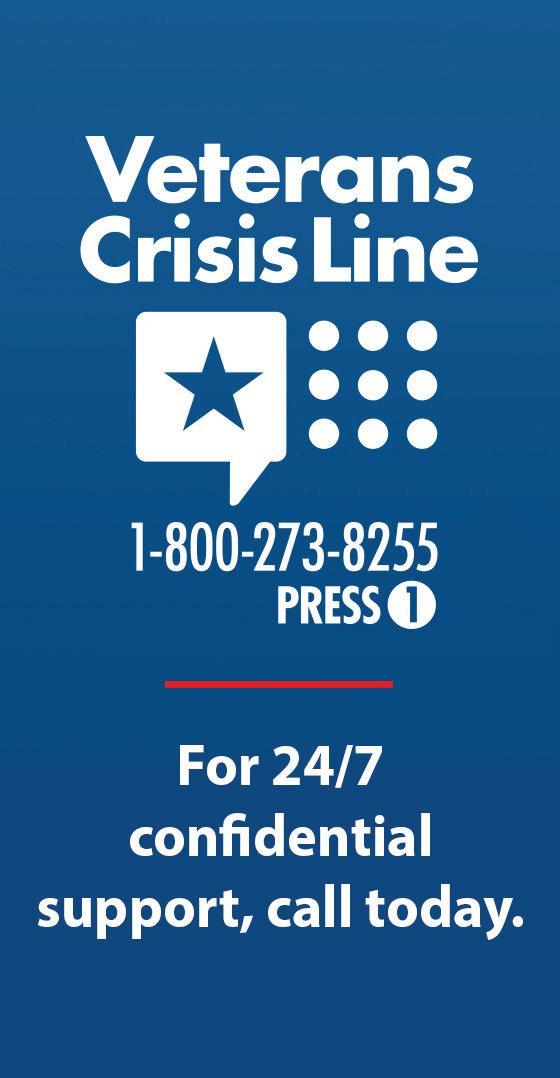
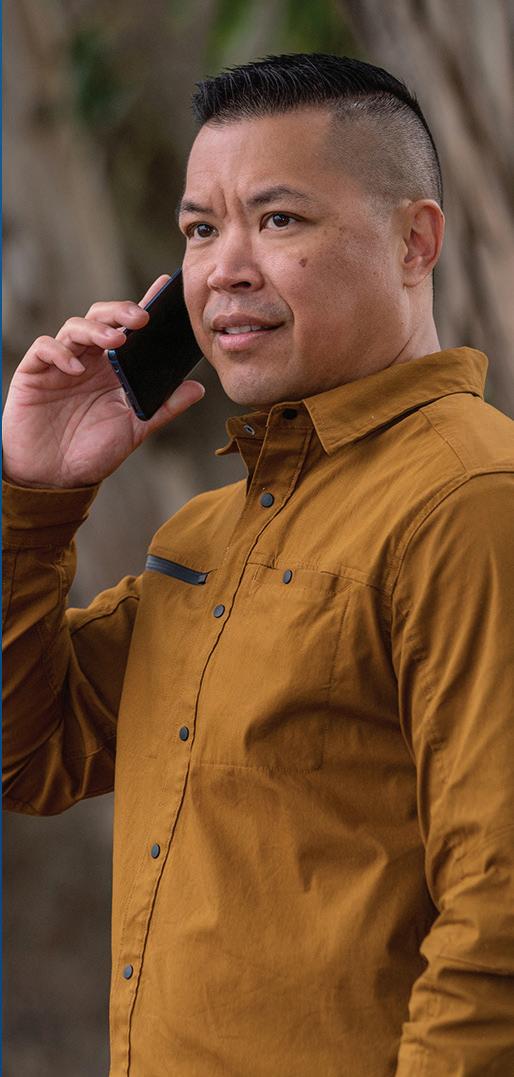
Veterans, service members and their loved ones can contact the Veterans Crisis Line to receive free, confidential support 24 hours a day even if they are not registered with the federal VA or enrolled in VA health care.
Call 988 and press 1, send a text message to 838255, or start a confidential online chat session at www.VeteransCrisisLine.net/chat.
Military sexual trauma (MST) refers to sexual assault or sexual harassment experienced during military service. Veterans of all genders and from all types of backgrounds have experienced MST. The federal VA can provide physical and mental health treatment to help veterans cope with MST and the impacts it can have. Access MST-related services by calling your nearest VA medical center (see directory on page 9) and asking to speak to the MST coordinator. Or contact a Vet Center and ask to speak with someone about MST-related counseling.
People cope with stressful situations in different ways. If you feel like you might be heading toward a crisis, VA or community-based services could help. Take a confidential, anonymous risk assessment to see if stress and depression might be affecting you at www.vetselfcheck.org/welcome.cfm
These signs may indicate that a veteran needs help.
• Appearing sad or depressed most of the time
• Hopelessness
• Anxiety, agitation, sleeplessness, or mood swings
• Feeling as if there is no reason to live
• Feeling excessive guilt, shame, or sense of failure
• Rage or anger
• Engaging in risky activities without thinking
• Increasing alcohol or drug misuse
• Losing interest in hobbies, work, or school
• Neglecting personal welfare and appearance
• Withdrawing from family and friends
• Showing violent behavior, like punching a hole in the wall or getting into fights
• Giving away prized possessions
• Getting affairs in order, tying up loose ends, or writing a will
These signs require immediate attention:
• Thinking about hurting or killing yourself
• Looking for ways to kill yourself
• Talking about death, dying, or suicide
• Self-destructive behavior, such as drug abuse, risky use of weapons, etc.
If you are experiencing any of these warning signs and need medical attention, call 911 now. For immediate help in dealing with a suicidal crisis, call the Veterans Crisis Line at 988.
Vet Centers are communitybased counseling centers in all 50 states and US territories that provide a wide range of social and psychological services including professional readjustment counseling to eligible veterans, service members – including National Guard and Reserve components – and their families. Counselors and outreach staff, many of whom are veterans themselves, are experienced and prepared to discuss the tragedies of war, loss, grief and transition after trauma. To learn more, contact the nearest Vet Center in Oregon. Teams are also available 24/7 by phone at 1-877-927-8387.
CENTRAL OREGON VET CENTER
1645 NE Forbes Road Ste 105 541 749 2112
EUGENE VET CENTER
190 E 11th Avenue 541 465 6918
GRANTS PASS VET CENTER 211 SE 10th Street 541 479 6912
PORTLAND VET CENTER
1505 NE 122nd Avenue Ste 110 503 688 5361
SALEM VET CENTER
2645 Portland Road NE St 250 503 362 9911
VET CENTER CALL CENTER
1-877-WAR-VETS (877-927-8387)
Around-the-clock confidential call center where combat veterans and their families can call to talk about any issue they are facing.
MORE INFO: www.vetcenter. va.gov/index.asp
Many veterans turn to higher education to further their skills and training after serving their country.
The Veteran Educational Bridge Grant is administered by ODVA to help student veterans achieve their educational goals. This grant is specifically designed to provide some support to student veterans that find themselves unable to complete their academic programs on time due to the unavailability of a required class. The Veteran Educational Bridge Grant offers grants of up to $5,000 to veterans that meet the eligibility requirements . For more information or to fill out an application, visit www.oregon.gov/odva/agencyprograms/grants/Pages/Educational-Bridge-Grant. aspx.
All universities and local community colleges in Oregon use the recommendations made by the American Council on Education (ACE) to award academic credit toward a degree for education and training received in the military.

To claim college credit for military training, request a transcript from your military service branch. Each service branch will provide official copies to schools at no charge.
Voyager is a tuition benefit that is available to honor and support Oregon residents who served the nation as members of the National Guard or Reserve in an active duty capacity in a combat zone since Sept. 11, 2001.
Voyager is a “last dollar award.” Qualifying students will be awarded a fee remission for no more than the difference between campus tuition and mandatory fees and expected military tuition benefits. The student is responsible for obtaining federal military tuition benefits. If a student is not eligible for federal tuition benefits, they must demonstrate proof of ineligibility.
Application forms and process information is available at campus financial aid offices. Contact your university financial assistance department for more information.
Nonresident veterans who are pursuing undergraduate studies pay tuition rates and fees no greater than the Oregon resident rate. Veterans must establish Oregon residency within one year of enrollment at one of the seven university campuses.
To qualify, the nonresident veteran must have served in the Armed Forces of the United States and been relieved or discharged from that service under honorable conditions.
Eligible non-resident veteran students should contact the financial aid office at Oregon universities to request this benefit.
Oregon Apprenticeship Opportunities Statewide is offered through the Oregon Bureau of Labor and Industries (BOLI).
If eligible, an apprentice may use veterans´ educational benefits while registered in an apprenticeship program. If an existing apprenticeship program does not have an approved veteran’s program in place, veterans can coordinate the establishment of a new training program by communicating with an employer and the Apprenticeship and Training Division. Contact the Oregon Bureau of Labor and Industry at 971-673-0761 or www.oregon.gov/boli/ apprenticeship/Pages/default.aspx
The state of Oregon now offers eligible members of the Oregon National Guard the chance to get an education without having to worry about paying for school tuition, provided they attend an Oregon community college or public university and are working toward an associate or bachelor’s degree. For more information or to find out if you qualify, visit www.oregonarmyguard.com.
The Post-9/11 GI Bill® provides financial support for education and housing to honorably discharged veterans with at least 90 days of aggregate service on Title 10 Active Duty or Title 32 Active Guard Reserve Duty after Sept. 10, 2001, or individuals discharged with a service-connected disability after 30 days.
The Post-9/11 GI Bill® will pay eligible individuals full tuition and fees directly to the school for all public school in-state students attending classes at a greater than half-time rate. A monthly housing allowance (MHA) based on the basic allowance for housing (BAH) for an E-5 with dependents is also provided.
This benefit provides up to 36 months of education benefits and is now a lifetime benefit. (Previously, "regular" Post 9/11 GI Bill® benefits expired 15 years from discharge.) Prior to discharge, this benefit may be transferred to dependents and spouses based on number of years of active service. More information online at www.gibill.va.gov
The Pat Tillman Foundation’s Tillman Military Scholars program supports our nation’s active and veteran service members and their families by removing financial barriers to completing a degree or certification program of choice. The scholarships cover not only direct study-related expenses such as tuition and fees, but also other needs, including housing and child care. More information online at www.pattillmanfoundation.org/tillman-scholars-militaryscholarships
Montgomery GI Bill (MGIB) benefits are available for service members and veterans to help with education and training costs by providing cash and numerous support programs. MGIB can be used to pay for many different programs including bachelor’s degrees, business technical or vocational courses, distance learning including correspondence courses, apprenticeship/job training, flight training, licensing and certification exams. If you left the military after January 1, 2013 there is no time limited on using the GI Bill benefit. More information online at www.gibill.va.gov
Top-Up allows the federal VA to reimburse an individual for all or a portion of the charges for courses that are not reimbursed under certain military education programs. The amount of this benefit can be equal to the difference between the total cost of a college course and the amount of tuition assistance that is paid by the military for the course. To be eligible for the Top-Up benefit, the person must be approved for federal tuition assistance by a military department and be eligible for Montgomery GI Bill or the Post-9/11 GI Bill. More information online at www.gibill.va.gov.
Did you know that your military service education benefits can be applied to on-the-job training opportunities as a first responder, electrician, plumber, and many other apprenticeship opportunities?
On-the-job training (OJT) allows eligible veterans to use their Post-9/11 GI Bill ® , Montgomery GI Bill , Montgomery GI Bill-Selected Reserve or the Veteran Readiness and Employment (VR&E) benefits toward apprenticeship and on-the-job training opportunities rather than formal education.
Depending on your circumstances, OJT can provide a monthly tax-free stipend on top of your base salary while still in probationary status!
Dependents or survivors may also qualify.
For more information, contact ODVA's Campus Coordinator at 1-800-6929666 or CampusVets@ odva.oregon.gov
Most Oregon colleges have a veteran resource center on campus to help you reach your educational goals.
REAP is a Department of Defense (DoD) education benefit program designed to provide educational assistance to members of the Reserve components called or ordered to active duty in response to a war or national emergency (contingency operation) as declared by the president or Congress.
Eligible veterans must be a member of a Ready Reserve component (Selected Reserve, Individual Ready Reserve or Inactive National Guard) to pay into the “buy-up” program. Guard members are eligible if they were serving under Title 32 orders for 90 consecutive days as authorized by the president or secretary of defense for a national emergency and is supported by federal funds.
The DoD and Department of Homeland Security (Coast Guard) will determine eligibility. More information online at www.benefits.va.gov/ BENEFITS/factsheets/education/CH1607.pdf
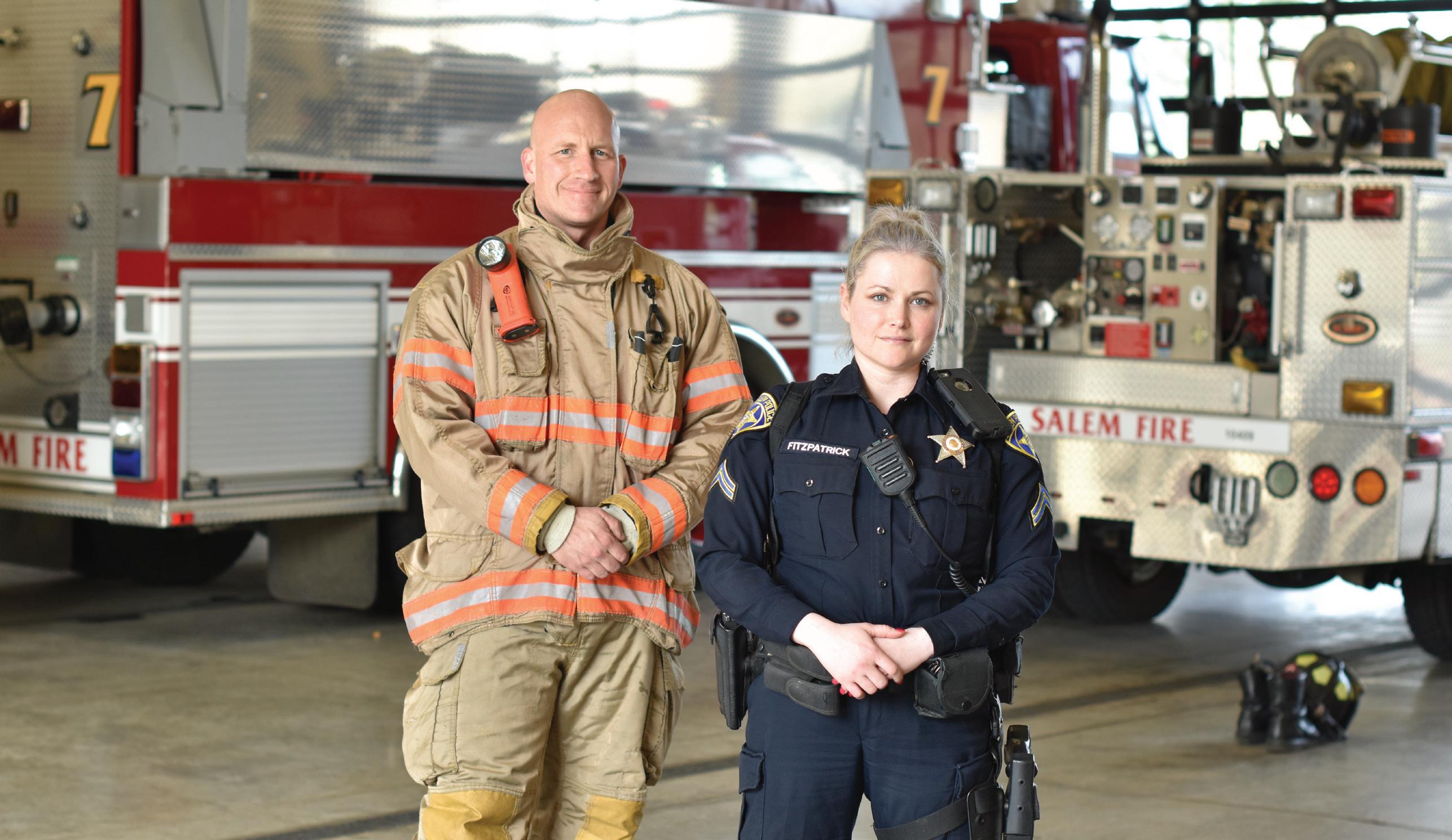
The program was enacted to assist eligible individuals with payment of their tuition and fees in instances where costs exceed the most expensive in-state undergraduate tuition at a public institution of higher education. To be eligible, the student must be a veteran receiving benefits at the 100 percent benefit rate payable, a transfer-of-entitlement-eligible dependent child or spouse of a veteran.
VA will match the school’s percentage (up to 50 percent) to reduce or eliminate out-of-pocket costs for eligible participants.
To receive this benefit your school must agree to participate in the Yellow Ribbon Program. Six of seven Oregon Universities institutions participate. More information online at www.gibill.va.gov/ benefits/post_911_gibill
The Veteran Readiness and Employment (VR&E) provides veterans with service-connected disabilities help with job training, education, employment accommodations, resume development, and job seeking skills coaching. Other services may be provided to assist veterans and service members in starting their own businesses or independent living services for those who are severely disabled and unable to work in traditional employment.
Eligibility and entitlement for VR&E are two different things. You may meet eligibility criteria, yet not be entitled to services. The first step in the VR&E process is to be evaluated to determine if you qualify for services. More information online at www.benefits.va.gov/vocrehab
Care at an Oregon Veterans’ Home is an earned benefit available to honorably discharged veterans, their spouses, and parents of a service member who died while serving in the U.S. Armed Forces.
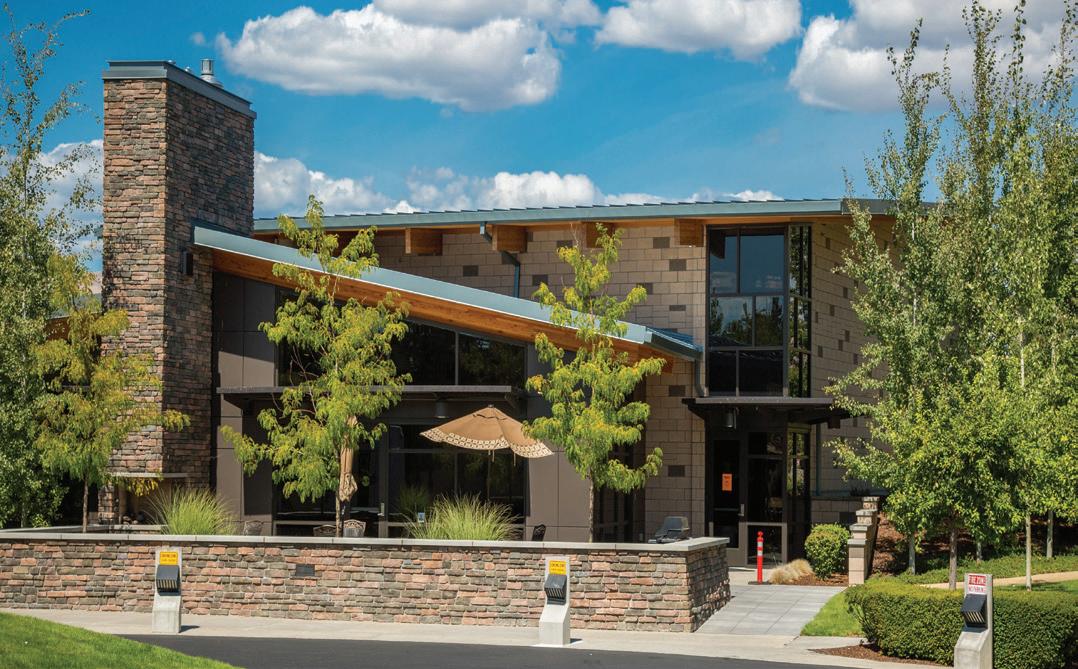
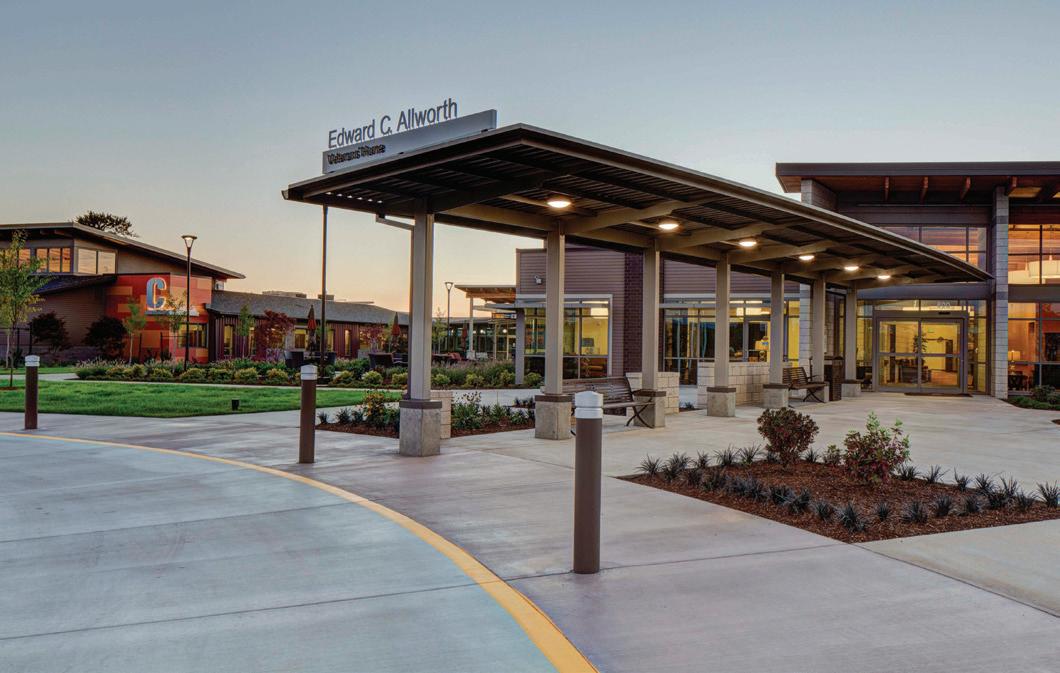
OREGON VETERANS’ HOME - THE DALLES
700 Veterans Drive, The Dalles, Oregon 97058 541 296 7190
www.thedalles.oregonveteranshomes.com
OREGON VETERANS’ HOME - LEBANON
600 North 5th Street, Lebanon, Oregon 97355 541 497 7265
www.lebanon.oregonveteranshomes.com
ELIGIBILITY, COST AND ADMISSION ASSISTANCE
Residents at the Oregon Veterans’ Homes receive skilled nursing care from experienced staff who understand the unique needs of veterans and their family members. Oregon Veterans’ Homes enjoy higher occupancy rates than the state average because of this commitment to providing the highest quality of care at lower costs to veteran residents.
ELIGIBILITY To be eligible, an applicant must be a veteran as defined by the federal VA, the spouse of a veteran or a Gold Star parent, and need
skilled nursing level of care as recommended by a physician.
COST Typically, veterans who have a 70 percent or greater service-connected disability and are in need of skilled nursing care due to their disability may be eligible to have their cost of care covered by the federal VA. The homes are also Medicare and Medicaid certified and the veteran’s private pay rate is significantly lower than most nursing homes.
Part of the homes’ affordability comes from an established
veteran benefit that allows veteran residents to combine private, federal, and/or Medicare or Medicaid to cover daily costs.
Daily rates include room, board and skilled nursing care, and, in some cases, medication. Specialized memory care is an additional cost.
ADMISSIONS Our staff will gladly assist veterans and their families during the application process to determine the best options for financing your living arrangements and cost of care.
QUESTION: What is a state veterans' home?
ANSWER: A veterans home is a facility that offers skilled nursing, rehabilitation and memory care to veterans, spouses and surviving spouses of veterans, and Gold Star parents who are in need of this care. Skilled nursing care is when a person needs assistance with activities of daily living (ADL) such as bathing, dressing, eating and ambulation. Rehabilitation care includes services that help you keep, get back or improve activities of daily living and can include physical, occupational or speech therapy.
Q: What's the difference between an Oregon Veterans’ Home and other skilled nursing facilities?
A : One of the main differences is that we have the privilege of concentrating on serving veterans and their families. We take pride in serving our residents with the honor and dignity they deserve after their service and sacrifice for our country. We do this through recognizing military culture, honoring traditions and respecting each resident’s personal experiences.
Another unique aspect of our homes are payment options. Like many such facilities in Oregon, our homes are Medicare-and Medicaid-certified facilities. What is unique is that they are also certified by the federal VA, which means the federal VA pays a base amount, called a daily per diem, for every veteran, which is approximately one-third of the cost of care. For veterans who have a service-connected disability rating of 70-percent or more, the federal VA pays the entire cost of care.
Q: Are there unique needs that are more common in the aging veteran population than the civilian population?
A: Absolutely! One of the more important differences you see in our population is the influence of military and veteran culture. The
unique experiences related to their service time creates a bond, vocabulary and rapport that is important to recognize, support and honor. There are shared stories of basic training, military life and the horrors of battle that only veterans can relate to and appreciate.
Clinically, our veterans generally present with medical needs you would expect the overall elderly population to experience such as congestive heart failure, chronic obstructive pulmonary disease (COPD), complications from diabetes, circulatory and neurological issues, various forms of dementia and so on. Most of our veterans use assistive devices such as wheelchairs, walkers, oxygen and powered scooters. However, we do see clinical issues unique to veterans such as battle-related injuries and trauma and mental health issues, including post-traumatic stress disorder (PTSD).
Q: What are the different types of care offered at the Oregon Veterans’ Homes?
A: Both of the Oregon Veterans’ Homes are licensed as skilled nursing facilities and provide nursing care, physical, occupational, and speech therapy. Many other services surround and support these core functions such as social services, recreational therapy, housekeeping, laundry, food service, maintenance and business office functions. Most services support the veterans by providing assistance with activities of daily living. Of course, our ultimate goal is to go beyond this level of service and provide our veterans with a meaningful life that restores a sense of purpose.
Q: What is the resident experience like?
A: Promoting the dignity and value of our veterans, their spouses and Gold Star parents, is very important to us here at the Oregon Veterans’ Homes. The underscoring mission of the Oregon Veterans’ Homes is to be “The Place Where Honor Lives.”
Everything we do, from the application process, to personal care, to activities, to the food we serve, to the claims work we do for benefits is with the veteran in mind. Even after a veteran leaves the facility, our aim is to honor them and their service. We teach military culture to the care team, promote our mission of honor to the hundreds of volunteers who serve across our campuses, and reach out to our communities for support and involvement for and with our veteran residents.
Q: What does the application process involve?

A: After establishing military eligibility, an
interested veteran, spouse or Gold Star parent completes the application for admission. The homes can mail this document, or one can be downloaded from either OVH website. The 1010EZ is a federal VA form that also needs to be filled out.
Once these documents are completed, the OVH care team reviews them to make sure the veteran or spouse meets the Activities of Daily Living (ADL) requirement. An applicant must need assistance with a minimum of three ADLs to be eligible for residence at one of our homes according to the federal VA.
Numerous resources are available to help veterans, as well as their families and caregivers, with the challenges of growing older or living with a serious disability, including nursing and home care, respite care and financial services.
Oregon has one of the largest concentrations of aging veterans in the country, with slightly more than half of the veteran population being age 65 or older. This includes those who served during World War II and Korea, as well as the largest demographic in the state: Vietnam veterans.
These numbers are expected to rise in the coming years, both in Oregon and nationwide. By 2027, a projected 55 percent of the state’s veterans will be over 65. Aging veterans have unique needs and experiences, and the state must be proactive in the care of this growing population.
Older veterans and their families will need access to long-term care, home and community based services, prosthetics, physical and mental health care, expanded medical transportation and pharmaceuticals as this trend continues to increase over the next 40 years.
The Oregon Department of Veterans' Affairs Conservatorship Program serves veterans, their surviving spouses, minor children or helpless adult children of veterans, and dependent parents.

Professional Trust Officers assist Oregon veterans in managing their financial affairs and property while helping ease the burdens often associated with paying bills, collecting funds on debts owed to the veteran, corresponding with creditors, buying or selling real estate, or other investments. Trust officers are experts in Oregon law, administrative rules and veterans law and regulation. Whenever possible, they work closely with family members in planning for the welfare and best interest of the veteran, their spouse or dependent.
A conservator is granted possession of all income
and assets, and establishes a personal budget and pays for care, personal needs, dependent support, property maintenance, etc., according to that budget. A conservator applies for all benefits for which the protected person may be eligible and invests or otherwise conserves unused funds.
An accounting of financial activities is submitted to the court, the federal VA, protected persons and others as required by law. For a person with substantial income, assets or property who is unable to manage his or her finances well enough to provide adequate care themselves, a conservator may be needed.
Causes may include mental illness or deficiency, physical illness or disability, chronic use of drugs or controlled substances, disappearance or confinement, chronic intoxication, and helpless or minor children.
A petition asking for the appointment of a conservator may be submitted to a court by anyone interested in the estate, affairs or welfare of the person. This includes parents, guardians, custodians or any person who would be adversely affected by lack of effective management of the property or affairs. The court appoints a conservator and the order remains in effect until the person’s condition improves, age of majority is reached, or until death.
ODVA also offers Representative Payee Services for veteran clients and their dependents. As a Representative Payee, ODVA acts in a limited capacity to pay the bills on behalf of their clients. Contact ODVA to learn more about the Conservatorship or Representative Payee Program at 503-373-2085.
PROGRAM OF COMPREHENSIVE ASSISTANCE FOR FAMILY CAREGIVERS (PFAFC)
The Program of Comprehensive Assistance for Family Caregivers (PCAFC) is for eligible veterans who have incurred or aggravated a serious injury in the line of duty on or before May 7, 1975, or on or after September 11, 2001. This program may provide resources, education, support, a financial stipend, and health insurance, beneficiary travel, to caregivers of eligible veterans. Benefits are planned to be expanded for all veterans of all eras in October 2022. For more information, visit https://www.caregiver.va.gov/ support/support_benefits.asp or call the toll-free Caregiver Support Line at 1-855-260-3274.
Caregiver Support Coordinators are stationed at every federal VA medical center and can help caregivers navigate the services and supports that are available to them. Learn more about VA’s Caregiver Support Program, or locate the caregiver support coordinator closest to you at www.caregiver.va.gov .
This service provides supportive care to veterans on a short-term basis to give the caregiver a planned period of relief from the physical and emotional demands associated with providing care. Respite care can be provided in the home or other non-institutional settings.
Skilled home care is provided by the federal VA and contract agencies to veterans that are homebound with chronic diseases and includes nursing, physical/ occupational therapy, and social services.

Hospice and palliative care programs offer pain management, symptom control, and other medical services to terminally ill veterans or veterans in the late stages of the chronic disease process. Services also include respite care as well as bereavement counseling to family members.
While some veterans qualify for indefinite nursing home care services, other veterans may qualify for a limited period of time. Among those that automatically qualify for indefinite nursing home care are veterans whose serviceconnected condition is clinically determined to require nursing home care and veterans with a service-connected rating of 70 percent or more. Other veterans may be provided short-term nursing home care if space and resources are available.
Oregon currently has Veterans' Homes located in The Dalles and Lebanon. These homes offer skilled nursing, rehabilitative and memory care in an environment that understands the unique needs of veterans. More information on pages 16-17.
The federal VA Patient Advocacy Program is for all veterans and their families who receive care at any federal VA health care facility and need someone to help with care concerns.
If you need help getting care or getting your problems resolved, talk to the Patient Advocate at your nearest federal VA Medical Center (listed on page 9).
Oregon has a Long-Term Care Ombudsman Office that helps residents living in licensed longterm care facilities address issues of quality of care, residents’ rights, charges for services, and more. Services are free and confidential. Anyone concerned about the care and well-being of residents can call 1-800-522-2602.
Whether you are looking to purchase your first home or adapt an existing residence to fit your service-connected needs, ODVA and its partners want to help you achieve your dreams of home ownership and independent living.
Oregon is one of only five states in the nation that offers a state home loan to veterans and has lent approximately $8 billion in low-interest home loans to more than 334,000 veterans since 1945. This benefit is separate and distinct from the federal VA Home Loan Guaranty and currently offers loans up to the Fannie Mae limit for single family purchases. The ODVA Home Loan Program may be used only to purchase an owner-occupied single-gamily home in Oregon. No refinancing options currently available. Learn more at www. oregon.gov/ODVA/Home-Loans/Pages/default.aspx
The federal VA does not actually lend the money to veterans. Federal VA guaranteed loans are made by private lenders, such as banks, savings and loans, or mortgage companies. The VA guaranty means the lender is protected if the veteran fails to repay the loan. You can apply for a VA loan with any mortgage lender that participates in the VA home loan program. The spouse of a veteran can also apply for home loan eligibility. Visit www. benefits.va.gov/homeloans or call the Home Loan Eligibility Center at 888-768-2132 for more information.

The federal VA may approve a grant for the actual cost, up to a maximum of $20,387 (for fiscal year 2022) for adaptations to a veteran’s residence that are determined by the VA to be reasonably necessary. A temporary Residence Adaptation Grant in the amount of up to $7,318 may be available to adapt a family members home if a veteran currently qualifies for the SHA. The grant also may be used to assist veterans in acquiring a residence that already has been adapted with special features for the veteran’s disability. To qualify for this grant, veterans must be entitled to compensation for permanent and total serviceconnected disability due to certain specifications.
The federal VA may approve a grant of not more than half of the cost of building, buying or remodeling adapted homes, or paying indebtedness on homes previously acquired, up to a maximum of $101,754 for fiscal year 2022.
Veterans must be entitled to compensation for permanent and total service-connected disability to qualify. A temporary Residence Adaptation Grant in the amount of up to $40,983 as of 2022 may be available to adapt a family members home if a veteran currently qualifies for the SAH.
For more information about SHA and SAH grants, visit www.va.gov/housing-assistance/disabilityhousing-grants.
The federal VA through its Specially Adapted Housing Assistive Technology (SAHAT) Grant Program is authorized to award grants of up to $200,000 per fiscal year to encourage the development of specially adapted housing assistive technologies.
There are many emerging technologies that could improve home adaptions or enhance a veteran’s or service member’s ability to live independently, such as voice-recognition and voice-command operations, living environment controls, and adaptive feeding equipment.
For more information on the SAHAT Grant Program, please write to sahinfo.vbaco@va.gov.
Veterans who have available loan guaranty entitlement may also obtain a guaranteed loan or possibly a direct loan from the federal VA to supplement the grants to acquire a specially adapted home.
The HISA program provides funding for disabled veterans to make home improvements necessary for the continuation of treatment or for disability access to the home, essential lavatory and sanitary facilities.
Disabled veterans may be eligible for HISA when it is determined medically necessary or appropriate for the effective and economical treatment of the service-connected disability. For more information about the HISA program, please vist www. prosthetics.va.gov/psas/HISA2.asp
Disabled veterans may qualify to “borrow” from the state of Oregon to pay property taxes to the county.
To qualify, veterans must be determined eligible to receive or be receiving federal Social Security disability benefits due to disability or blindness. If you qualify, the Oregon Department of Revenue will pay property taxes to the county. Six percent of the taxes are deferred, and a lien will be placed
on the property. All taxes plus interest and fees must be repaid.
Applicants must file their requests with their local county assessor’s office. For more details, visit the Department of Revenue online at www.oregon. gov/DOR/programs/property/Pages/deferral.aspx or your county assessor.
If you are a disabled veteran, you may be entitled to exempt some of your homestead property’s assessed value from your property taxes. To qualify, veterans must be certified by the VA or any branch of the Armed Forces as having disabilities of 40 percent or more or be a veteran who served and is certified each year by a licensed physician as being 40 percent or more disabled.
Active duty service members, including National Guard and military reserve forces, as well as the surviving spouses of veterans, may also qualify for a residential property tax exemption.
For more details visit the Department of Revenue online at www.oregon.gov/DOR/programs/ property/Pages/exemptions.aspx or your county assessor.
PROGRAM HIGHLIGHTS
ODVA's Home Loan benefit offers eligible veterans fixedrate financing for:
• Owner-occupied, single family residence
• Up to the Fannie Mae limit
• Purchase only (no refinancing is available)
• Up to four (4) home loan maximum life benefit
PROGRAM REQUIREMENTS
These requirements are general in nature and are not the only and final authority on eligibility or lending decisions.
• Up to 97% LTV available
• Private mortgage insurance is required for all loans in excess of 80% LTV.
• Property must be located
within the state of Oregon; however, veteran borrowers are not required to be an Oregon resident upon application.
To be eligible, veterans must have an honorable discharge status and meet one of these three criteria:
1) Veteran must have served on active duty with the U.S. Armed Forces:
• For more than 90 consecutive days beginning on or before Jan. 31, 1955; or
• For more than 178 consecutive days beginning after Jan. 31, 1955; or
• For 178 days or less and was discharged because of a serviceconnected disability; or
• For 178 days or less and has a disability rating from the federal VA; or
• For at least one day in a combat zone.
2) Received a combat, campaign or expeditionary ribbon or medal for service; or
3) Is receiving a non-serviceconnected pension from the federal VA.
In addition to lending, ODVA remains as the servicer for all loans. This allows for excellent and familiar customer service for veteran borrowers, as well as flexibility over the life of the loan. Our goal is to provide all Oregon veterans affordable lifetime home ownership.
Veterans' families also make great sacrifices in service to their country. See below for more information about benefits and programs that may be available to you as a veteran's spouse, dependent or survivor.

Dependency and Indemnity Compensation (DIC) is the primary monthly monetary benefit payable to surviving dependents of a deceased veteran, and is the equivalent benefit to disability compensation for veterans. This benefit is payable if the veteran died while on active duty, in the line of duty and not due to willful misconduct; or, if death was after service, the death was caused or attributed to a service-connected disability.
Survivors’ (Death) Pension is a needs-based benefit paid to an unremarried surviving spouse, or an unmarried child, who meets certain age or disability requirements, of a deceased wartime veteran.
In order to qualify for a VA Death Pension, the VA calculates income received from most sources by the surviving spouse and any eligible children. It includes earnings, disability and retirement payments, unemployment insurance payments, interest and dividends payments, and net income from farming, business or rental property.
If the income is below a certain level, the dependent or surviving spouse may be eligible for this pension.
Dependents and surviving spouses of an eligible veteran are eligible to be buried in national cemeteries.
When a death occurs and eligibility for interment in a national cemetery is determined, grave space is assigned by the cemetery director in the name of the veteran or family member. One gravesite is permitted for the interment of all eligible family members, unless soil conditions or the number of family decedents necessitate more than one grave. There is no charge for burial in a national cemetery.
Spouses and dependents are not eligible for a government-furnished headstone or marker unless they are buried in a national cemetery, state veterans cemetery, or military post/base cemetery.
When a military retiree dies, their retirement pay stops. This may mean that the surviving spouse no longer receives a monthly income. One option for surviving spouses is the Survivor Benefit Plan (SBP). The SBP is an insurance plan that will pay the veteran’s surviving spouse a monthly payment (annuity) to help make up for the loss of retirement income. Survivors should report retiree deaths to the Defense Finance and Accounting Service (DFAS) Casualty Office at 800-321-1080
The spouse of a veteran can also apply for home loan eligibility under one of the following conditions: Unremarried spouse of a veteran who died while in service or from a service-connected disability, or spouse of a service member missing in action or a prisoner of war, or surviving spouse who remarries on or after attaining age 57.
The Civilian Health and Medical Program of the VA (CHAMPVA) is a comprehensive health care program in which the VA shares the cost of covered health care services and supplies with eligible beneficiaries. Due to the similarity between CHAMPVA and the Department of Defense (DoD) TRICARE program, the two are often mistaken for each other.
CHAMPVA is a federal VA program, whereas TRICARE is a regionally managed health care program for active duty and retired members of the uniformed services, their families and survivors. In some cases a veterans may look to be eligible for both/either program on paper. However, if you are a military retiree, or the
spouse of a veteran who was killed in action, you are and will always be a TRICARE beneficiary.
Learn more about CHAMPVA at www.va.gov/ health-care/family-caregiver-benefits/champva or call TriCare at 888-847-9378
The Post-9/11 GI Bill also offers some service members the opportunity to transfer their GI Bill benefits to dependents. An individual approved to transfer an entitlement to educational assistance under this section may transfer the individual’s entitlement to the individual’s spouse, or one or more of the individual’s children, or any combination of spouse and child. A family member must be enrolled in the Defense Eligibility Enrollment Reporting System (DEERS) and be eligible for benefits at the time of transfer to receive transferred educational benefits. Visit www.gibill.va.gov.
This state benefit provides a full tuition waiver (excluding fees) for a bachelor’s, master’s or associate degree at an Oregon University System institution or community college for children and spouses (who have not remarried) of a member of the U.S. Armed Forces who either died in active duty, became 100 percent disabled in connection with military service (universities only), or died as a result of a disability sustained in active duty. Dependents of recipients who earned a Purple Heart after Sept. 11, 2001, are also eligible to receive a tuition waiver from Oregon universities.
Eligibility differs slightly for community colleges and universities. Call the college admissions department for detailed information on this benefit.
DEA is a federal VA benefit that provides education and training opportunities to eligible dependents, spouses and survivors of certain veterans. The program offers up to 45 months of education benefits. To be eligible, you must be the dependent or spouse of a veteran who died or is permanently and totally disabled as the result of a service-connected disability, a veteran who died from any service-connected disability, a service member missing in action or captured in line of duty, or a service member who is hospitalized or receiving outpatient treatment for a service connected permanent and total disability. Visit www.va.gov/education/survivor-dependentbenefits.
Children of an active duty member of the Armed Forces who has died in the line of duty on or after September 11, 2001, are eligible for the Marine Gunnery Sergeant John David Fry Scholarship. Eligible children may receive up to their full tuition & fees for a public school or a statutory annual maximum amount for a public school, plus a monthly living stipend and book allowance under this program. Visit www.gibill.va.gov
If you are a disabled veteran or the surviving spouse or registered domestic partner of a veteran, you may be entitled to exempt part of your homestead property’s assessed value from property taxes. The exemption amount increases by 3% each year. The exemption is first applied to your home and then to your taxable personal property. For full qualifications and how to file for the exemption, visit www.oregon.gov/DOR/forms/ FormsPubs/veteran-spouse-exemption_310-676. pdf.

Every veteran who honorably serves their country has earned the right to be laid to rest with honor and dignity — among their brothers and sisters in arms, if they wish. There are a number of benefits available to help guide veterans in deciding their wishes for a final resting place.
The federal VA has implemented a pre-need burial eligibility determination program to assist anyone who would like to know if they are eligible for burial in a VA national cemetery. Veterans and their eligible family members are encouraged to plan in advance to use federal VA burial benefits that veterans have earned through their military service. Planning in advance for a veteran’s or loved one's final resting place can eliminate unnecessary delays and reduce stress on a family at a difficult time.
Burial in a national cemetery is open to all members of the U.S. Armed Forces and veterans who have met minimum active duty service requirements, as applicable by law, and were discharged under conditions other than dishonorable. Spouses, minor children and, under certain conditions, dependent unmarried adult children are also eligible for burial even if they predecease the veteran.
More information and forms can be found on the VA’s website: www.cem.va.gov/cem/pre-need/ index.asp
If a veteran’s death is service-connected, the VA will pay a burial allowance. If the veteran is buried in a VA national cemetery, some or all of the cost of moving the veteran’s body to the national cemetery nearest the veteran’s home may also be reimbursed. There is no time limit for applying for a service-connected burial allowance. The person who bore the veteran’s burial expense may claim reimbursement from any VA regional office. For full eligibility requirements, visit www.va.gov/ burials-memorials/veterans-burial-allowance/
Under certain circumstances, the federal VA may
pay a non-service-connected burial allowance if they determine the veteran’s passing was not related to their military service. The non-serviceconnected burial allowance amount paid depends on the circumstances of the veteran’s passing, such as if they were hospitalized by the VA at the time of their death. A claim for this non-serviceconnected burial allowance must be filed within two years of the veteran’s burial or cremation. For full eligibility requirements, visit www.benefits. va.gov/compensation/claims-special-burial.asp
When a veteran is buried in a cemetery that is not under U.S. government jurisdiction, the federal VA may also pay a plot allowance, provided that the veteran was discharged under a condition other than dishonorable and meets other qualifications similar to that of a non-service connected death.
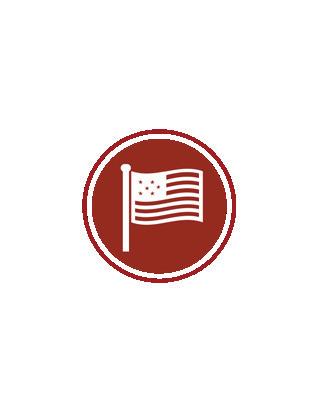
To file for reimbursement of burial expenses an Application of Burial Allowance form must be submitted to the VA. The person filing the claim must also provide a certified copy of the veteran’s death certificate and proof of the veteran’s military service (Form DD 214), and itemized bills of the funeral and burial expenses.
A United States flag is provided, at no cost, to drape the casket or accompany the urn of a deceased veteran who served honorably in the U. S. Armed Forces. It is furnished to honor the memory of a veteran’s military service to his or her country. When burial is in a national, state or post cemetery, a burial flag will automatically be provided. When burial is in a private cemetery, the funeral director will generally help the next of kin with this process.
The federal VA furnishes upon request, at no charge, a government headstone or marker for the unmarked grave of any eligible veteran in any cemetery around the world, regardless of their date of death.
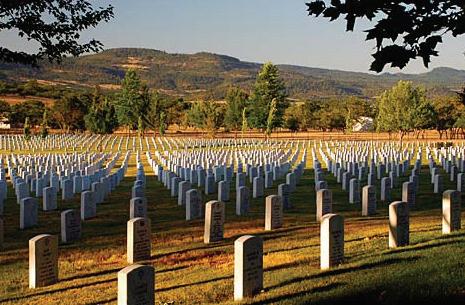

For eligible veterans that died on or after Nov. 1, 1990, and whose grave is marked with a privately purchased headstone, the VA may also furnish a headstone or marker to supplement the grave or a medallion to be affixed to the privately purchased headstone. Eligible veterans are entitled to either a government-furnished headstone or marker, or the medallion, but not both. If requested, the medallion is furnished in lieu of a traditional government headstone or marker.
The VA National Cemetery Administration cannot provide burial at sea. For information, contact the U.S. Navy Mortuary Affairs office toll free at 866-787-0081.
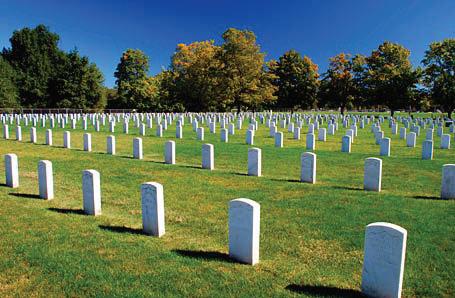
A Presidential Memorial Certificate (PMC) is an engraved paper certificate, signed by the current president, to honor the memory of honorably discharged deceased veterans. More information can be found online at www.va.gov/burials-memorials/memorialitems/presidential-memorial-certificates/
The Department of Defense is responsible for providing dignified military funeral honors to veterans who have defended our nation.
Upon the family’s request, Public Law 106-65 requires that every eligible veteran receive a military funeral honors ceremony, to include folding and presenting the United States burial flag and the playing of “Taps.”
More information is available at www.cem. va.gov/military_funeral_honors.asp
CERTIFICATION OFFICE OF BUSINESS INCLUSON AND DIVERSITY (COBID)
www.oregon.gov/biz/Pages/default.aspx
If you are a veteran interested in starting or growing your own business, you are not alone! The state of Oregon and many of its partners are on your side and want to help you secure a financial future for you and your family.
COBID is the certifying agency for the Oregon Service-Disabled Veteran Certification. Other certifications include Minority Business Enterprise (MBE), Women Business Enterprise (WBE), Emerging Small Business (ESB) and Disadvantaged Business Enterprise (DBE) certifications.
VETS FIRST VERIFICATION PROGRAM
Help Desk: 866-584-2344
Status: verificationfollowup@va.gov
Profile Questions: vip@va.gov
The federal VA has developed a Verification Assistance Program to help veterans understand the verification policy and process. The goal of the program is to reduce the risk of denial due to lack of understanding and misinterpretation of the regulation.
STATE OF OREGON PROCUREMENT SERVICES
503-378-3976 or 503-373-2106
www.oregon.gov/DAS/EGS/ps/Pages/index.aspx
Oregon Department of Administrative Services Procurement Services (DAS PS) is the enterprisewide purchasing authority for the state of Oregon.

SECRETARY OF STATE CORPORATION DIVISION
503-986-2200
www.FilingInOregon.com
The Corporation Division is where you go to start a business, become a notary or file a lien on personal property. The division provides information to support business, and ensures that registration processes are fast, simple and easy as possible.
www.gcap.org
The Government Contract Assistance Program (GCAP) is part of a nationwide network of Procurement Technical Assistance Centers (PTAC) working to help small businesses compete successfully in the federal, state and local government marketplace.
OFFICE OF SMALL BUSINESS ASSISTANCE
503-986-2200 or 844-469-5512
Business.SOS@state.or.us
www.oregon.gov/smallbusiness/Pages/default.aspx
Oregon’s Office of Small Business Assistance: an independent voice for small businesses within state government. Your time is money; and when you get stuck in red tape with a state agency, it can be costly for your business. The Small Business Advocate can help you solve those problems, cut the red tape, and prevent the whole thing from happening again.
BUSINESS OREGON
503-986-0123 or 866-467-3466
www.oregon.gov/biz/Pages/default.aspx
Business Oregon works to create, retain, expand and attract businesses that provide sustainable, living-wage jobs for Oregonians through publicprivate partnerships, leveraged funding and support of economic opportunities for Oregon companies and entrepreneurs.
SCORE
503-326-5211
www.portlandor.score.org
Score provides free business counseling and mentoring to anyone who wants to start a business or is operating a small business. Members have professional experience and training and come from a variety of business backgrounds. Score will match your interests or questions with a volunteer who can work with you. Score also offers low cost workshops on basic business, bookkeeping, marketing and similar topics.

www.bizcenter.org
The Small Business Management Program is an ODOT sponsored educational resources for any state certified firms able to perform work for ODOT. Online and classroom programs are also available.
www.oregon.gov/odot/business/ocr/pages/ index.aspx
The project-specific mentor-protégé program is designed to assist firms in expanding their capacity to perform larger and more challenging ODOT contracts.
www.bizcenter.org
The OSBDC provides advising, training, online courses and resources for businesses throughout Oregon. They work with businesses in every industry and at every stage of growth from startups to well-established companies.
US
503-326-2682 | www.sba.gov/OR pdxhelp@sba.gov
The U.S. Small Business Administration (SBA) was created in 1953 as an independent agency of the federal government to aid, counsel, assist and protect the interests of small business concerns, to preserve free competitive enterprise and to maintain and strengthen the overall economy of our nation.
OREGON EMPLOYMENT DEPARTMENT
SELF EMPLOYMENT ASSISTANCE PROGRAM (SEAP)
503-451-2400 or 877-345-3484
www.oregon.gov/EMPLOY/Unemployment/ Pages/SEA-Informational-Page.aspx
SEAP is an option for unemployment insurance claimants who have been identified as likely to run out of unemployment benefits before they return to work. Enrolled SEAP claimants may attend selfemployment assistance counseling/training and engage in activities on a fulltime basis. Participants must complete both a written business plan and a market feasibility study.
Veterans bring valuable skills and experience from their military service to the workforce. Resources are available to help veterans get the most out of their careers — whether seeking advancement at a current position or looking for the right fit for a first civilian job.
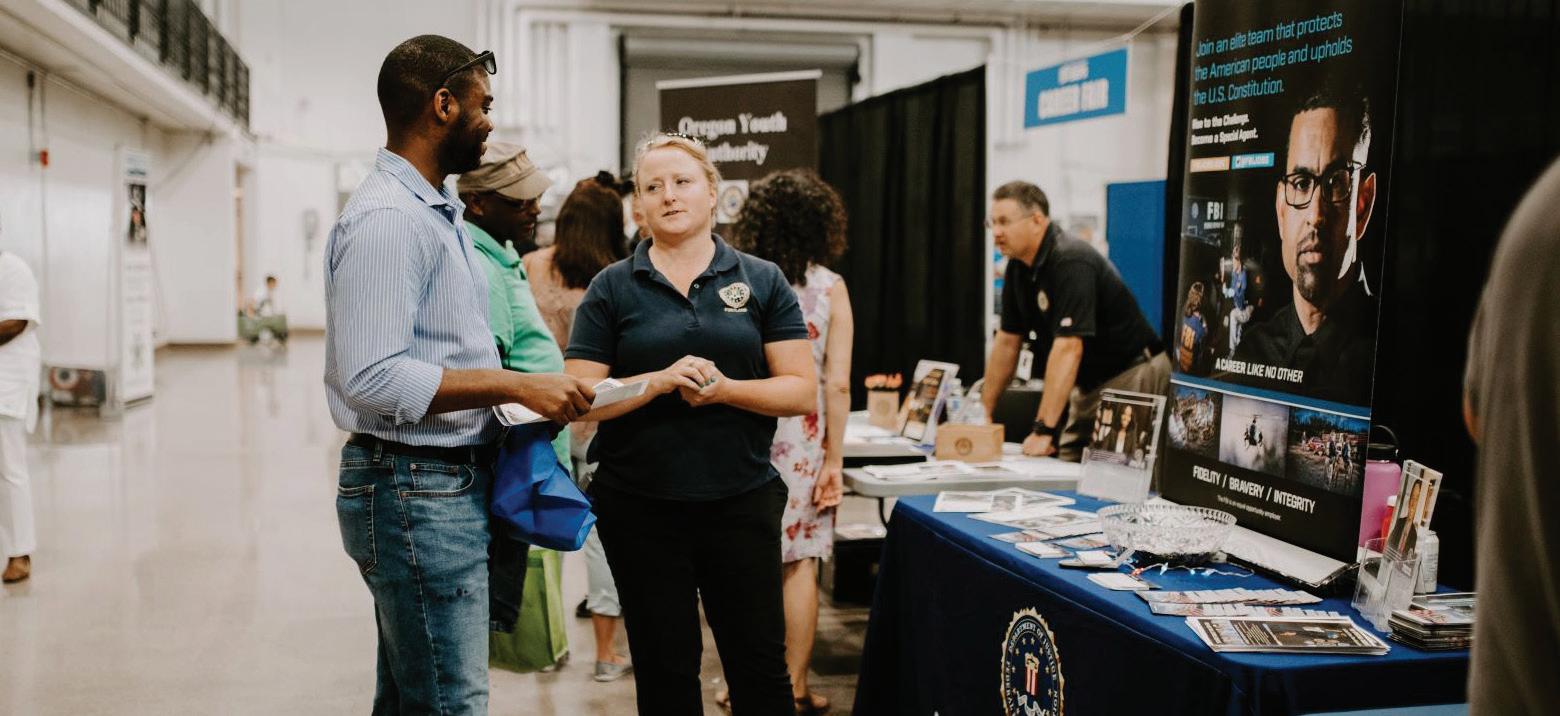
Under Oregon law, a public employer must grant preference to a veteran or disabled veteran who applies for a vacant civil service position or seeks promotion to a job if the veteran successfully completes an application screening, exam or civil service test, and meets the minimum and any special qualifications for the job.
The law calls for public employers to add five percentage points for a veteran and 10 percentage points for a disabled veteran to their total examination score. If the employer doesn’t score applicants for promotions, then the agency must “devise and apply methods” to give special consideration to veterans and disabled veterans. More information on veteran preference within Oregon public sector jobs can be found on BOLI’s website at www.oregon.gov/jobs/ pages/veterans.aspx
FEDERAL VETERANS’ PREFERENCE
Veterans’ preference gives eligible veterans preference
in appointment over many other applicants. Veterans’ preference applies to virtually all new appointments in both the competitive and excepted service.

Veterans’ preference does not guarantee veterans a job and it does not apply to internal agency actions such as promotions, transfers, reassignments and reinstatements.
Veterans’ preference can be confusing. In accordance with title 5, United States Code, Section 2108 ( 5 USC 2108), Veterans’ preference eligibility is based on dates of active duty service, receipt of a campaign badge, Purple Heart, or a service-connected disability. Please know that not all active duty service may qualify for veterans’ preference.
Only veterans discharged or released from active duty in the armed forces under honorable conditions are eligible for veterans’ preference. This means the discharge must have been under an honorable or general discharge conditions.
Retired members of the Armed Forces are eligible if a disablility rating has been awarded by the military or federal VA or the retirement was below the rank of major or its equivalent.
There are three types of preference eligibles, disabled (10 point preference eligible), non-disabled (5 point preference eligible) and sole survivorship preference (0 point preference eligible). Zero-point preference eligible means that no points are added to the passing score or rating of a veteran who is the only surviving child in a family in which the father or mother or one or more siblings.
Learn more about eligibility to receive veteran preference for federal jobs at www.fedshirevets.gov/ veteran-employees/veterans-preference/#content
Through Worksource Oregon, veterans and their spouses may qualify for priority of service in employment and training services. This includes priority referrals to jobs and other services over nonveteran applicants with the same qualifications.
WorkSource staff give priority of service if:
• You are a veteran that served at least one day in the active-duty military service, and were discharged or released under conditions other than dishonorable; or
• You are an eligible spouse of a veteran; or
• You are a National Guard member who has been mobilized by federal authorities (i.e., activated and deployed under presidential orders).
Veterans can find employment information, education and training opportunities, job counseling, job search workshops and resume preparation assistance at state Workforce Career or One-Stop Centers through the Employment Department. These offices have specialists who work directly with veterans and disabled veterans to find employment.
Disabled Veterans Outreach Program Specialists (DVOPs) and Local Veterans Employment Representatives (LVERs) assist veterans in applying for federal, state, local government and private sector employment.
You are eligible for DVOP services if:
• You served on active duty for more than 180 days (not including training), and were discharged or
released under conditions other than dishonorable; or
• You were medically discharged, regardless of the amount of time you served on active duty; or
• You were a member of a National Guard or Reserve unit activated by presidential declaration, for which a campaign badge has been authorized for the full period of activation, and you were discharged or released under conditions than dishonorable.
DVOPs and LVERs have offices to serve all veterans in more than 20 Oregon cities. Find a veteran emplyment rep at www.oregon.gov/EMPLOY/jobseekers/Pages/ Veterans.aspx
This Oregon law was designed to get service members back to work quickly after serving in the military and requires professional licensing agencies and boards to accept military training or experience as substitution for education or experience required for licensure, certification or registration. Direct licensing does not apply to all vocations; however, professions that are named include: private security professional, teacher, engineer, land surveyor, psychologist, occupational therapist, occupational therapy assistant, physician assistant, nursing assistant, denture technology, chiropractor, physical therapist, radiologist, hemodialysis technician, athletic trainer, respiratory care, pharmacist, pharmacy technician, cosmetologist, mortician, embalmer, polygraph examiner, private investigator, and commercial driver.
Contact licensing boards and commissions for more information www.oregon.gov/highered/institutionsprograms/private/Documents/Oregon-OccupationalLicensing-Boards.pdf
Oregon Apprenticeship opportunities are offered through the Oregon Bureau of Labor and Industries (BOLI). If eligible, an apprentice may use veterans´ educational benefits while registered in an apprenticeship program.
If an existing apprenticeship program does not have an approved veteran’s program in place, veterans can coordinate the establishment of a new training program by communicating with an employer and the Apprenticeship and Training Division.
Typically, an apprenticeship lasts two to five years, depending on industry requirements.
Contact the Oregon Bureau of Labor and Industry at 971-673-0761 or www.oregon.gov/boli
Veterans and disabled veterans receive preference when applying for federal, state, county and local government jobs in Oregon.
The federal VA has the authority to provide eligible beneficiaries reimbursement for mileage, special mode of transportation, and in certain circumstances, a taxi or hired car.
If you meet the criteria below, you may be eligible for mileage reimbursement or special mode transport. You qualify if:
• You have a service-connected (SC) rating of 30 percent or more; or
• You are traveling for treatment of a SC condition; or
• You receive a VA pension; or
• Your income does not exceed the maximum annual VA pension rate; or
• You are traveling for a scheduled compensation or pension examination.
You qualify for Special Mode Transportation if:
• Your medical condition requires an ambulance or a specially equipped van as determined by a VA clinician; and
• You meet one of the eligibility criteria listed above; and
• The travel is pre-authorized (authorization is not required for emergencies if a delay would be hazardous to life or health).
Scheduled appointments qualify for round-trip mileage. Unscheduled visits may be limited to return mileage only. In order to be eligible for travel benefits when transporting to VA care or treatment, a veteran must actually be incurring an expense. Should one or more veterans travel together in a private vehicle, only the owner of the vehicle is actually incurring expenses and, therefore is the only person entitled to travel reimbursement.
However, should multiple veterans share a vehicle where passengers must pay for their transport such as a taxi or where one veteran pays another veteran for transport, then all are entitled to travel reimbursement either at the mileage reimbursement rate or actual expense, whichever is less. Such persons must provide a receipt to indicate an incurred expense and to receive
reimbursement. More information online at www. va.gov/health-care/get-reimbursed-for-travelpay/
The Veterans Administration has a transportation program for non-ambulatory and remote VA patients. The Veterans Transportation Program provides transport for veterans to federal VA medical centers (VAMCs.) These services include vehicle routing and scheduling software for VA Medical Facilities.
While all veterans with federal VA-funded medical appointments are eligible to ride VTS, a first priority is given to wheelchair-bound patients who have no other transportation alternatives. VTS is establishing a network of community and volunteer transportation service providers to improve access to VA health care, including the Portland VAMC.
Reservations are needed for transportation at least four full business days before the date transport is needed. Specific information about the veteran also is required. To make a reservation:

Portland MC 800-949-1004, ext. 57804
Roseburg 541-440-1000, ext. 41293
White City 541-826-2111, ext. 3619
Because many veterans lack transportation to and from VA medical facilities for needed treatment, Disabled American Veterans (DAV) operates a nationwide transportation network to meet this need. Through the Transportation Network, DAV volunteers drive veterans to and from VA medical facilities for treatment.
The Transportation Network is a clear example of veterans helping veterans. DAV has 189 Hospital Service Coordinators around the country who coordinate the transportation needs for disabled veterans. Contact your local medical center (page 9) for more information.
DID YOU KNOW?
DAV is always looking for volunteer drivers. If you are interested in volunteering in the DAV Transportation Network please visit www.dav. org/help-dav/volunteer/drive-a-van
The federal VA will pay for installation of adaptive equipment for automobiles deemed necessary to ensure that eligible veterans will be able to safely operate vehicles, and to satisfy the applicable state standards of licensure. This equipment includes power steering, power brakes, power window lifts, power seats and other special equipment necessary to assist the person into and out of the vehicle or other conveyance.
The federal VA will also repair, replace, or reinstall adaptive equipment determined necessary for the operation of a vehicle acquired under this program, or for the operation of a vehicle an eligible veteran may previously or subsequently have acquired. Work with a local VSO (see page 4) for more information.
The federal VA offers qualified disabled veterans and active duty service members a one-time payment to be used toward the purchase of an automobile or other forms of conveyance.
To qualify, a veteran or service member must have one of the following disabilities including loss, or permanent loss of use, of one or both feet; loss, or permanent loss of use, of one or both hands; or permanent impairment of vision in both eyes to a certain degree. For more information, visit www.benefits.va.gov/ compensation/claims-special-auto-allowance.asp.
One of the long-standing barriers to health care for veterans who live in rural areas of Oregon is transportation to appointments.
To help remedy this barrier, Oregon awards both federal and state grant funding to rural Area Transportation Districts to ensure medical-related transport is available to veterans. Veterans are picked up and delivered back to their own homes.
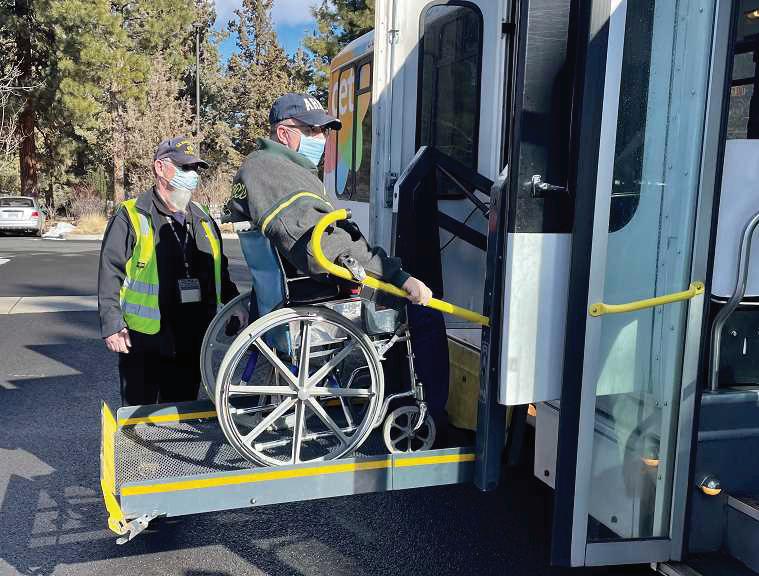
Routes have been established or use of existing transportation routes to transport to any needed health related appointment, not just VA medical facilities. Services including door-to-door service in ADAcompliant vehicles with assistance in loading or unloading at no cost to the veteran.
Locate services online at www.oregon.gov/ odva or contact a county veteran service office (page 4) to learn more about using this service.
The VA offers qualified disabled veterans and active duty service members a one-time payment to be used toward the purchase of a vehicle.
DID YOU KNOW?
First instituted in 2008, Oregon’s veteran license plate program was a joint effort between ODVA and the Oregon Department of Transportation (ODOT). Today, many specialty plates exist for veterans and their families. The purchase of these plates dedicate funding to organizations like Oregon Veterans’ Homes. Details are located on the DMV’s website.
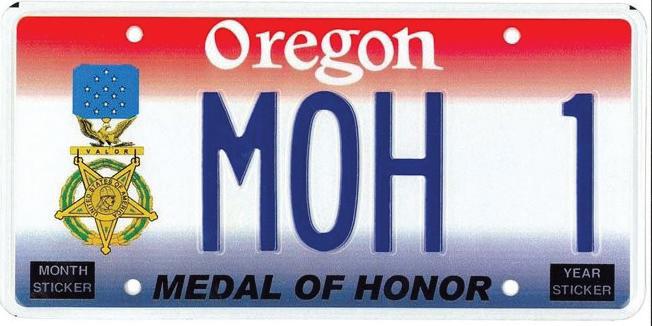
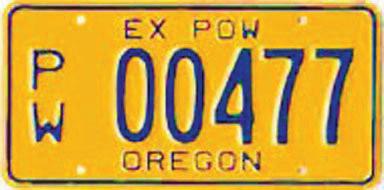

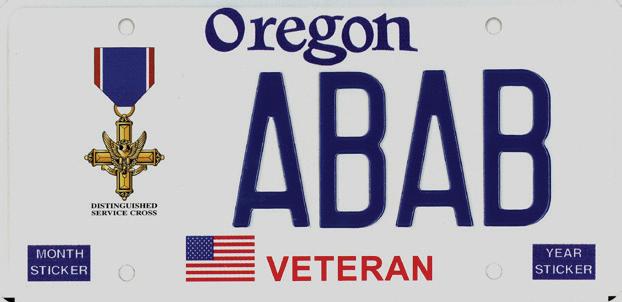
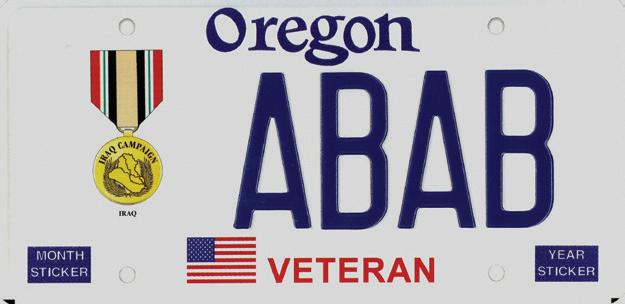
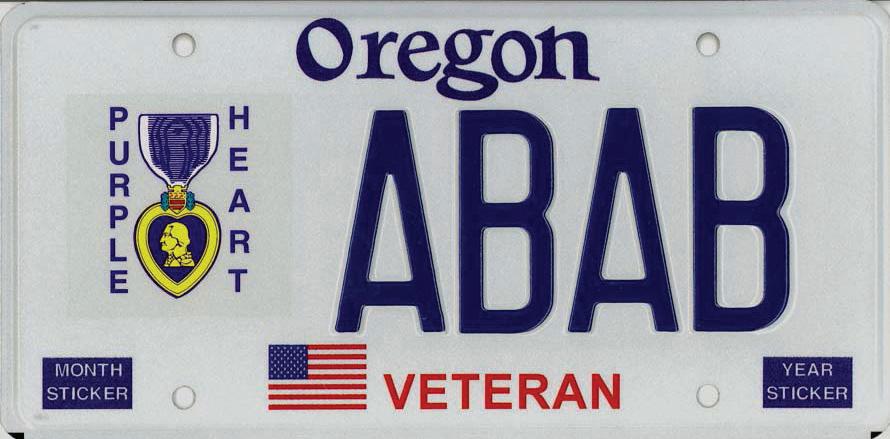
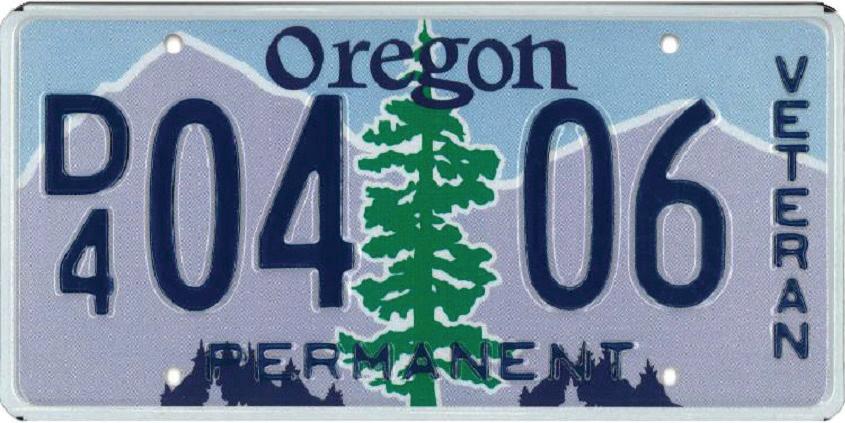
DEERS LOCATIONS
If you are an active duty, reserve or national guard service member, dependent or retiree, you can get a Military ID at any DEERS location within Oregon. Please note that not all locations allow walk-in appointments and are not open regular hours. Call ahead to your local DEERS location for details.
BEND
Bend Armory
875 SW Simpson Ave. Bend, OR 97702 971 355 7629
KLAMATH FALLS
Kingsley Field
211 Arnold Ave. Rm 306 Klamath Falls, OR 97603 541 885 6133
NORTH BEND
U.S. Coast Guard 2000 Connecticut Ave. North Bend, OR 97459 541 756 9665
PORTLAND
Oregon Air National Guard Base 6801 NE Cornfoot Rd. Bldg 170 Portland, OR 97218 503 335 4046
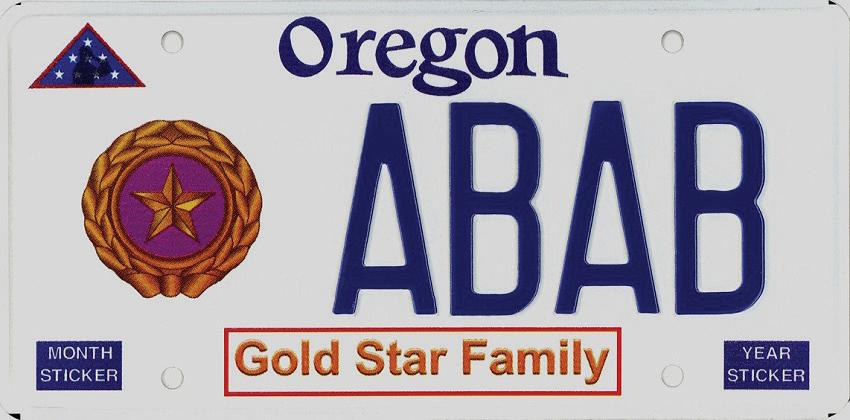
Naval & Marine Corps Reserve Center 6735 N Basin Ave. Portland, OR 97217 503 285 4566, Ext 525
SALEM
Oregon National Guard
Anderson Readiness Center 3225 State St. NE, Rm 231 Salem, OR 97301 971 355 4376
SPRINGFIELD
Armed Forces Reserve Center 3106 Pierce Pkwy Suite A Springfield, OR 97477 541 915 2391
WARRENTON
U.S. Coast Guard 2185 SE 12th Pl. Warrenton, OR 97146 503 861 6300
You served with pride, and the state offers a number of ways to support the public display of your veteran status. There are also times when you may need proof of service, such as for health care or consumer discounts.
The DMV offers a veteran designation that can be voluntarily placed on Oregon driver licenses. In order to receive the designation, veterans must be a United States veteran, provide proof of veteran status (DD 214 or DD 215), and meet all other Oregon requirements for a driving privilege or identification card including payment of the original, renewal or replacement fee. There is no additional fee for the veteran designation. Call your local DMV for more details.
The Oregon DMV offers specialty license plates to veterans, disabled veterans and qualifying family members. Plates that indicate branch of service, campaign or service medals are available along with some specialty plates that support service organizations such as the Gold Star family plate or the Purple Heart plates.
To obtain a veteran plate, proof of honorable military service (DD 214) and/or proof of award of a military related medal must be presented upon application at DMV. For more details visit www.oregon.gov/ODOT/DMV/ pages/vehicle/plateregular.aspx
The VHIC is issued only to veterans who are enrolled in the federal VA health care system and is used for identification and check-in at VA appointments. It cannot be used as an insurance card, and it does not authorize or pay for care at non-VA facilities.

A Veteran ID Card (VIC) is a form of photo ID you can use to get discounts offered to Veterans at many restaurants, hotels, stores, and other businesses. It is distinct from the ID cards the military issues to current service members, retirees, and certain veterans with a 100 percent disability rating.
You may be eligible if you served on active duty, in the Reserves, or in the National Guard, and received an honorable or general discharge (under honorable conditions). To apply, visit www. va.gov/records/get-veteran-idcards/vic
Veterans or their next of kin who need assistance in obtaining service records, a DD 214, or replacement awards and medals must formally request them through the National Personnel Records Center (NPRC). The NPRC is the records custodian for most discharged and retired
members of all branches of service. Requests can be made by mailing or faxing a Standard Form 180. The forms are available in any veteran service office or online at www.archives. gov/veterans
Requests to have military records corrected are handled through each branch of service’s Board for the Correction of Military Records. All requests to correct an error to military records must be filed within three years of discovery of the error and contain evidence, such as signed statements from you and other witnesses or copies of records that support your case. Applying for a correction is a simple process; however, it is recommended you use the services of a VSO (page 4).
You must make your application for discharge upgrade within 15 years of discharge. If your discharge is older than 15 years, you must apply for a change to your military records using the process detailed above. Form DD 293 (Application for the Review of Discharge or Dismissal from the Armed Forces) can be obtained from ODVA or a local VSO (page 4)
(continued on next page)
Disabled veterans may now obtain the new Oregon Wounded Warrior parking placard from the Oregon Department of Motor Vehicles. The Oregon Wounded Warrior parking placard is a disabled parking placard or decal with the “Oregon Wounded Warrior” sticker affixed to it.
This parking placard exempts the driver from paying fees in public parking areas with metered parking. It also enables veterans to park in time-limited spaces for longer than the posted limit (except in zones that are designated 30 minutes or less.)
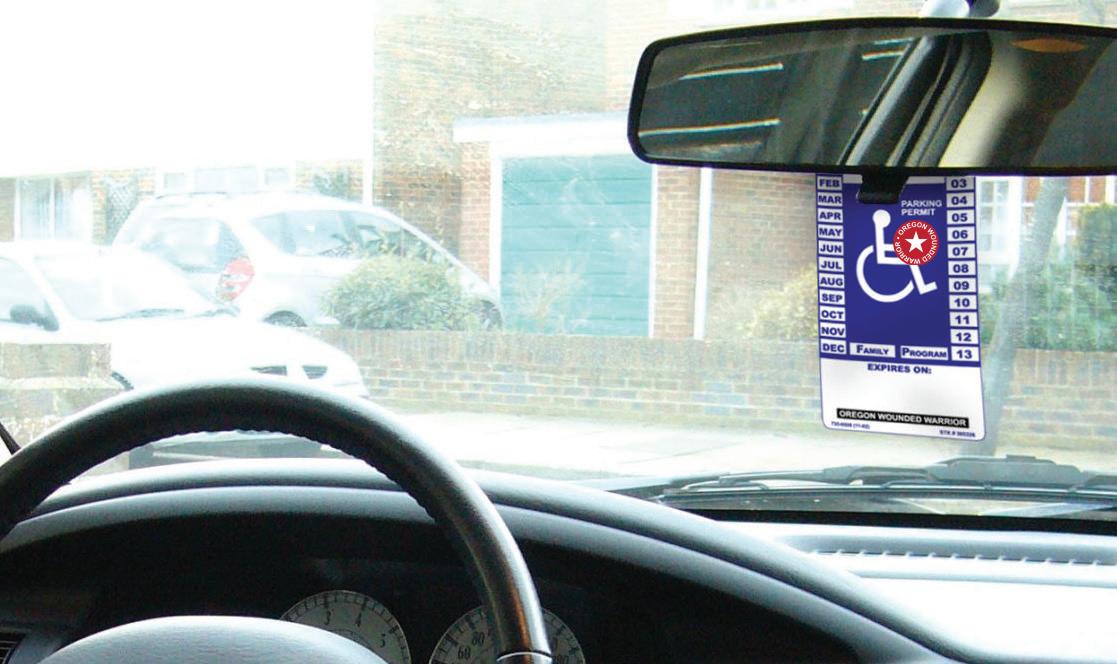
There is no fee for the placard, and it will carry the same expiration as the veteran’s driver license.
Eligibility includes Oregon veterans who qualify for a disabled parking permit from the Oregon Department of Transportation’s Driver and Motor Vehicles Division (DMV) and have a serviceconnected disability that is VA-rated at 50% or greater.
You will need to fill out Form 735-265, the DMV’s application for a disabled parking permit, and check the box for the Wounded Warrior placard.If you do not have already have a disabled parking placard, your physician will need to complete and sign the Certificate of Disability section of this form to confirm your eligibility for the handicap placard.
You must also submit a copy of your benefit summary letter (also known as the “tax abatement letter”) from the federal VA, confirming your service-connected disability rating of 50 percent or greater. This is a letter that is mailed annually to all disabled veterans. It comes in a bright green envelope.
If you need a copy of this letter, you can log into eBenefits to download a copy immediately, or you may request a copy from your local county veteran service office or VA regional office.
The completed form may be turned in at any DMV field office in the state or by mail to:
DMV Driver Issuance Unit
Parking Permits Clerk
1905 Lana Ave. NE Salem, OR 97314 503) 945-5000
For more information about Oregon disabled parking permits, visit www.oregon.gov/ODOT/ DMV/pages/driverid/disparking.aspx.
ODVA works with the veterans in the state prison system to verify veteran status, advocate for veterans benefits and assist veteran families with federal VA benefits that may be transferable to them.
VA benefits are affected if a veteran is convicted of a felony and imprisoned for more than 60 days. Disability compensation paid to an incarcerated veteran is temporarily reduced to a 10 percent rate while incarcerated. Payments are not reduced for participants in work-release programs, residing in halfway houses or under community control.
Failure to notify federal VA of a veteran’s incarceration can result in overpayment of benefits and the subsequent loss of all VA financial benefits until the overpayment is recovered.
VA benefits will not be provided to any veteran or dependent wanted for an outstanding felony warrant. The federal VA may be able to take a portion of the amount that an incarcerated veteran is not receiving and pay it to his or her dependents, if they can show need.
When a veteran is released from prison, his or her compensation or pension benefits may be restored. Depending upon the type of disability, the VA may schedule a medical examination to see if the veteran’s disability has improved or worsened.
For question or to request assistance through this process, contact ODVA's Incarcerated Veteran Program, 503-373-2085
There is a growing effort nationally and in Oregon to institute veterans’ courts or dockets to allow district attorneys to send military members and veterans into treatment, rather than jail, when they commit a non-violent offense.
These courts are staffed by people who take into consideration the charges and challenges facing veterans who return home from war.
They may allow some veterans and active service members to enter into mental health diversion programs as treatment for non-violent infractions as opposed to automatically jailing the offender.
The law relies on the judgment of a prosecutor, who will determine on a case-by-case basis which defendants may be eligible for diversion. These prosecutors must consider, for example, whether a veteran who spent four years at a military base should be offered the same diversion opportunity as one who deployed twice to combat situations in Afghanistan or Iraq.
Contact your local District Attorney’s office for information.
VJO offers outreach and case management to veterans involved in law enforcement encounters, overseen by treatment courts, and incarcerated in local jails.
Call Oregon’s VJO Coordinator, 503-220-8262, ext. 32716
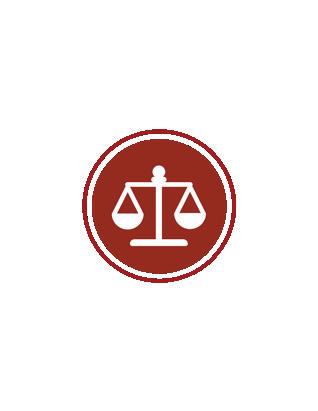
Homelessness among veterans in the U.S. has declined by almost 50 percent in the last decade, according to VA statistics. Today, nearly 6% of Oregon's homeless population are veterans.
Are you homeless and unsure of the veteran specific resources available to you? Call
If you are a homeless veteran or are trying to help a veteran avoid homelessness, contact the federal VA’s National Call Center for Homeless Veterans at 877-4AID-VET (877-424-3838) to speak to a trained VA responder. The hotline and online chat are free and neither VA registration nor enrollment in VA health care is required to use these services.
Expert responders staff the hotline for homeless veterans 24 hours a day, seven days a week. The responders can provide emergency support and resources to homeless veterans and family members, as well as community agencies and non-VA providers.
HUD-VASH
This joint Supported Housing Program between the federal VA and the U.S. Department of Housing and Urban Development (HUD) provides permanent housing and ongoing case management treatment services for homeless veterans who would not be able to live independently without the support of case management.
HUD’s Section 8 Voucher Program has designated
vouchers to Public Housing Authorities (PHAs) throughout the country for veterans who are homeless. These vouchers allow veterans to live in communities served by their VA medical facility where case management services can be provided.
Visit the HUD-VASH website for more information at www. va.gov/homeless/hud-vash.asp
The federal VA’s Compensated Work Therapy (CWT) consists of three unique programs which assist homeless veterans in returning to competitive employment: Sheltered Workshop, Transitional Work, and Supported Employment. Veterans in CWT are paid at least the federal or state minimum wage, whichever is higher.
The Homeless Veteran Supported Employment Program (HVSEP) provides vocational assistance, job development and placement, and ongoing supports to improve employment outcomes among homeless veterans and veterans at risk of homelessness. CWT veterans have been successfully employed over the years in

various competitive positions including, but not limited to, health care, information technology, manufacturing, warehousing, construction trades, clerical and office support. CWT programs develop an individual rehabilitation plan for each veteran and provide a wide range of support services to the veteran at the CWT locations. VA benefits including service-connected compensation, and non-service connected pensions cannot be reduced, denied, or discontinued based on participation in CWT.
The CWT program mission is to provide realistic and meaningful vocational opportunities to veterans, encouraging successful reintegration into the community at the veterans' highest functional level.
For more information, visit www.va.gov/health/cwt
The Transitional Residence (TR) program is a work-based Psychosocial Residential Rehabilitation Treatment Program offering a therapeutic residential setting for veterans involved in CWT. The TR program provides a rehabilitation-focused residential setting for veterans recovering from chronic mental illness, chemical dependency and homelessness.
TR provides a bridge between hospitalization or intensive outpatient treatment and successful community reintegration. It utilizes a residential therapeutic community of peer and professional support, with a strong emphasis on increasing personal responsibility and
achievement of individualized rehabilitation goals.
This program differs from other VA-operated residential bed programs in that participants contribute (using their CWT earnings) to the cost of operating and maintaining their residences and are responsible for planning, purchasing and preparing their own meals.
For more information, visit www.va.gov/homeless/gpd.asp
These programs provide a daytime sanctuary where homeless veterans can clean up, wash their clothing, and participate in a variety of therapeutic and rehabilitative activities. Linkages with longer-term assistance are also available.
Locations vary. Contact your local Vet Center or VA Community Based Outpatient Clinic (page 10) for locations and services in your area. Some services that are offered may vary.
Stand Downs are events that provide homeless veterans a variety of services and allow VA and community-based service providers to reach more homeless veterans. Stand Downs give homeless veterans a temporary refuge where they can obtain food, shelter, clothing and a range of community and federal VA and state assistance. In many locations, Stand Downs provide health screenings, referral and access to longterm treatment, benefits counseling, ID cards and access to other programs to meet their immediate needs.
For information on Stand Down dates and locations, please contact the Homeless Veterans Programs Office at 202-461-1857 or visit www.va.gov/HOMELESS
The Oregon Veterans’ Emergency Assistance Program is for veterans and their immediate family (spouse, unremarried surviving spouse, child, or stepchild) who are in need of emergency financial assistance. Assistance is granted one time only and average award amounts vary.
Emergency financial assistance includes, but is not limited to, emergency or temporary housing and related housing expenses, such as expenses for utilities, insurance, house repairs; mortgage or rent assistance; emergency medical or dental expenses; and emergency transportation expenses.
For more information contact ODVA at 503-373-2085.
Many military and service organizations have emergency relief programs specifically designated to help veterans and military members and their families. Inquire within local organizations about programs such as the Air Force Aid Society, American Legion Temporary Financial Assistance, Army Emergency Relief, Disabled American Veterans Disaster Relief Grants, Navy-Marine Corps Relief Society, Oregon National Guard Emergency Relief, Salvation Army Home Front War Relief Program and VFW Unmet Needs.
YOU KNOW?
Veterans have access to unique opportunities for hunting, fishing, hiking and other outdoor recreation at state and national parks and on other public lands. Always check for a veteran discount on park passes or sporting licenses.
Getting outside to fish, paddle, hike, camp, or boat can be healing. And, as a veteran, reduced rates and unique opportunities for hunting, fishing, hiking, and other outdoor recreation are available to veterans at state and national parks and on other public lands. Gold Star Families may also receive free access passes to more than 2,000 federal recreation sites.
Visit ODVA's Veteran Recreation page to learn how to plan your next outdoor adventure using your Oregon veteran benefits at www.oregon.gov/odva/ Benefits/Pages/Recreation.aspx

A free hunting and angling license for disabled war veterans rated at 25 percent service-connected disabled or more with the VA is offered through the Oregon Department of Fish and Wildlife. Veterans must be Oregon residents for at least six months. Hunting licenses are half-price ($16) for resident uniformed service member. Non-resident uniformed service members are able to hunt or fish in Oregon for the same cost as a state resident (non-service member). Visit www.myodfw.com/ articles/hunters-and-anglers-disabilities for more information.
Service-connected disabled veterans and active duty service members on official leave can apply for this pass from the Oregon Parks and Recreation Department. Passes are valid for four years and allow free parking at 26 Oregon state parks and free camping for up to 10 nights at a time at state RV and tent sites. Active duty members get the same benefit, but they have to pay up front and
then file for reimbursement. Additionally, all active duty service members can visit Oregon state parks for free on Memorial Day, Independence Day and Veterans Day.
Visit www.oregonstateparks.org/?do=v.page&id=19 for more information.
The Department of Fish and Wildlife currently operates a program to provide terminally ill children with hunting and fishing opportunities, at no charge, by issuing a certain number of free tags to nonprofit entities that organize and sponsor such adventures. The Legislature has expanded this by incorporating disabled veterans and Purple Heart recipents into the existing program.
A maximum of 35 tags will be made available to each year for both terminally ill children and veterans, with the former receiving precedence but being capped at 15. The measure also limits eligible veteran beneficiaries to one tag per year.
Active duty military on official leave are eligible to be reimbursed for state park visits. After your visit, send the camping receipt for the dates of your stay, and a letter from your CO on official letterhead stating you were on leave for the dates you camped.
The refund request must arrive no later than 30 days after departure date of your stay. Send a receipt to Oregon Parks and Recreation Dept., ATTN: Veterans Pass Program, 725 Summer St. N.E., Ste. C, Salem, OR 97301.
DID
Veterans with a service-connected disability may camp for free at Oregon state parks with a special access pass.
The America the Beautiful Parks Pass Series is your ticket to more than 2,000 federal recreation sites. Included in this series are two passes that benefit current service members and disabled veterans.
A free annual pass (normally $80) is available to active duty military, reserve and National Guard members and their dependents. A free access pass is also available to U.S. citizens or permanent residents with a permanent disability.
Each pass covers entrance fees at national parks and national wildlife refuges, standard amenity fees at national forests and grasslands and at lands managed by the Bureau of Land Management and Bureau of Reclamation. You can obtain a pass in person, with proper documentation, from a participating federal recreation site or office.
For more information, visit www.nps.gov/ planyourvisit/passes.htm
A new bill passed by the Oregon Legislature in 2019 allows individuals issued a resident disabled
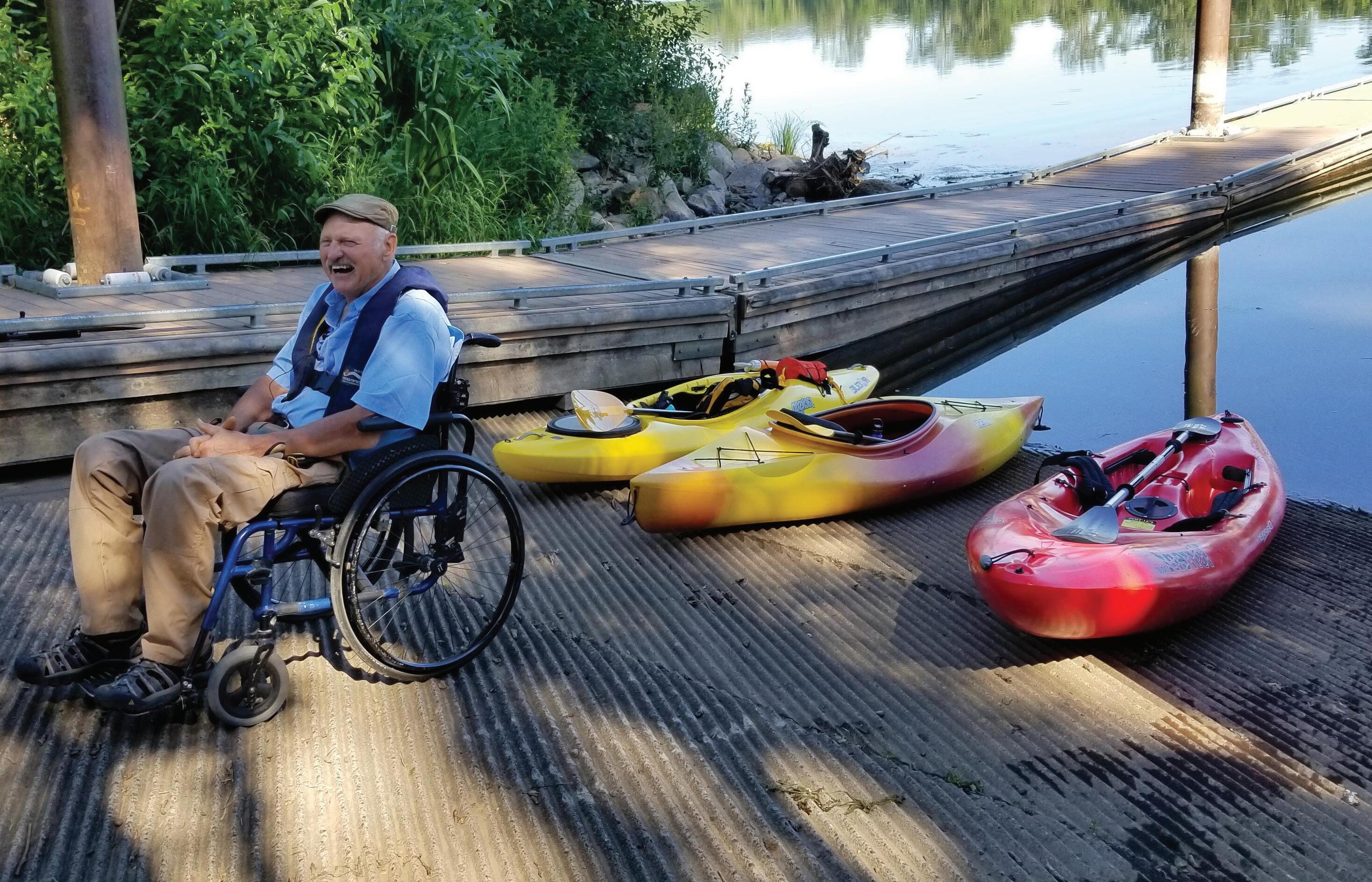
veteran hunting license to receive additional preference points in Oregon's controlled hunt permit system.
The Oregon Department of Fish and Wildlife issues tags for general hunting seasons as well as for limited-entry, controlled hunts. Most big game hunting in Oregon is limited-entry. Controlled hunts are organized by location and species, and hunters must apply in advance for an opportunity to participate in a random drawing to receive tags.
The system is designed to increase unsuccessful applicants' chances of receiving a deer or elk tag over time, by giving preference points every year they don't receive a tag. Current law also allows for additional preference points to be given to individuals issued a resident annual pioneer combination hunting and angling license (for persons at least 65 years old who have lived in Oregon at least 50 years).
Senate Bill 593 adds individuals issued a resident disabled veteran hunting license to those who are eligible to receive additional preference points for controlled hunts.
This new legislation took effect on Jan. 1, 2020.
Even if you are unsure about the benefits you or your family may qualify for or have been denied in the past, scheduling an appointment with a local VSO will ensure you are exploring all state and federal veteran benefits and programs that will assist you in connecting with your earned benefits.
